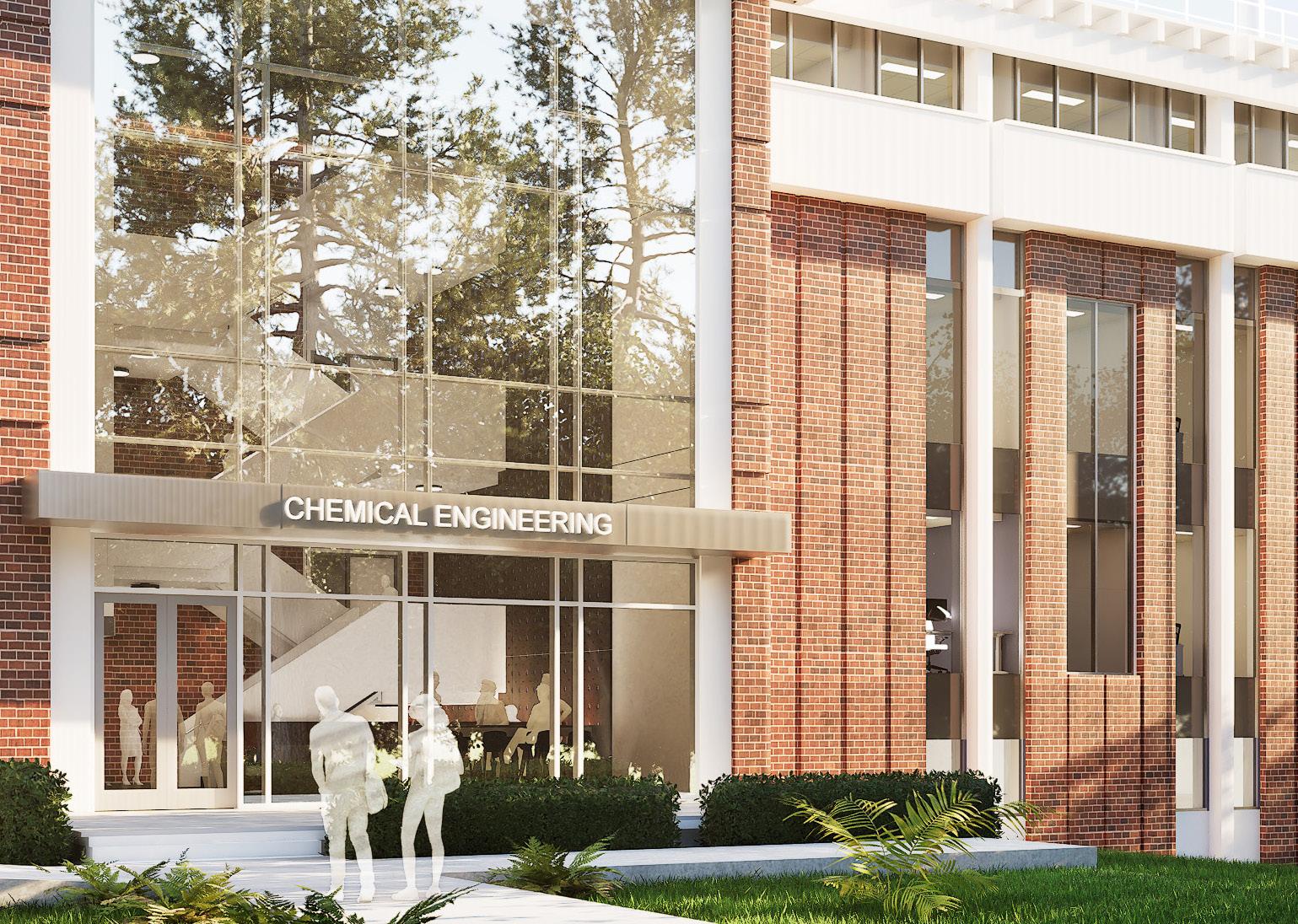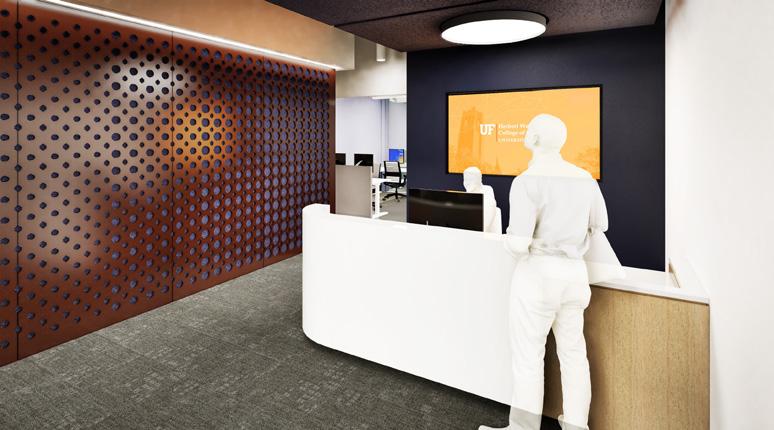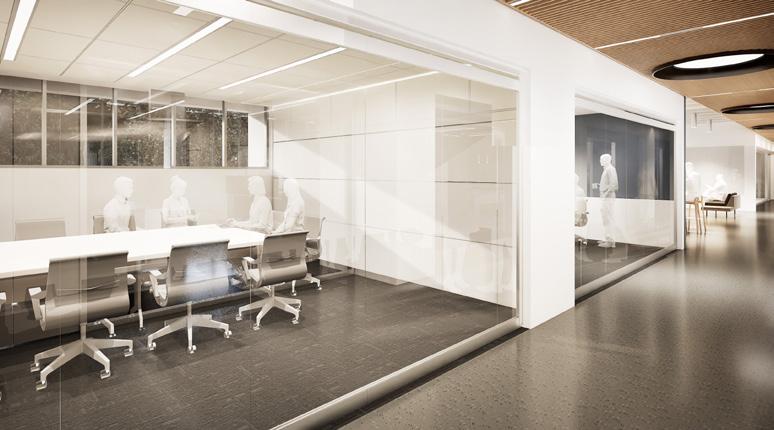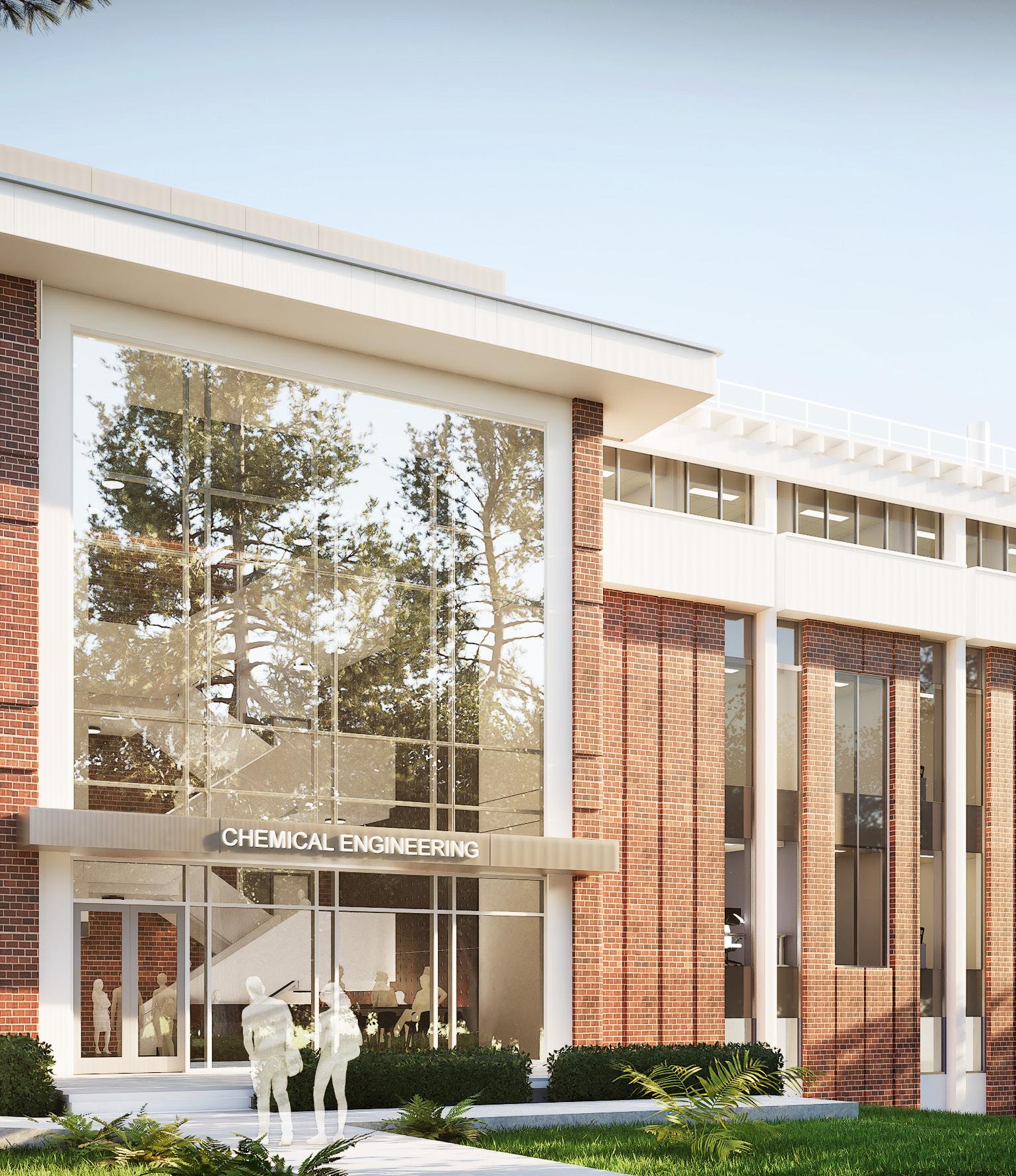

MESSAGE FROM THE CHAIR
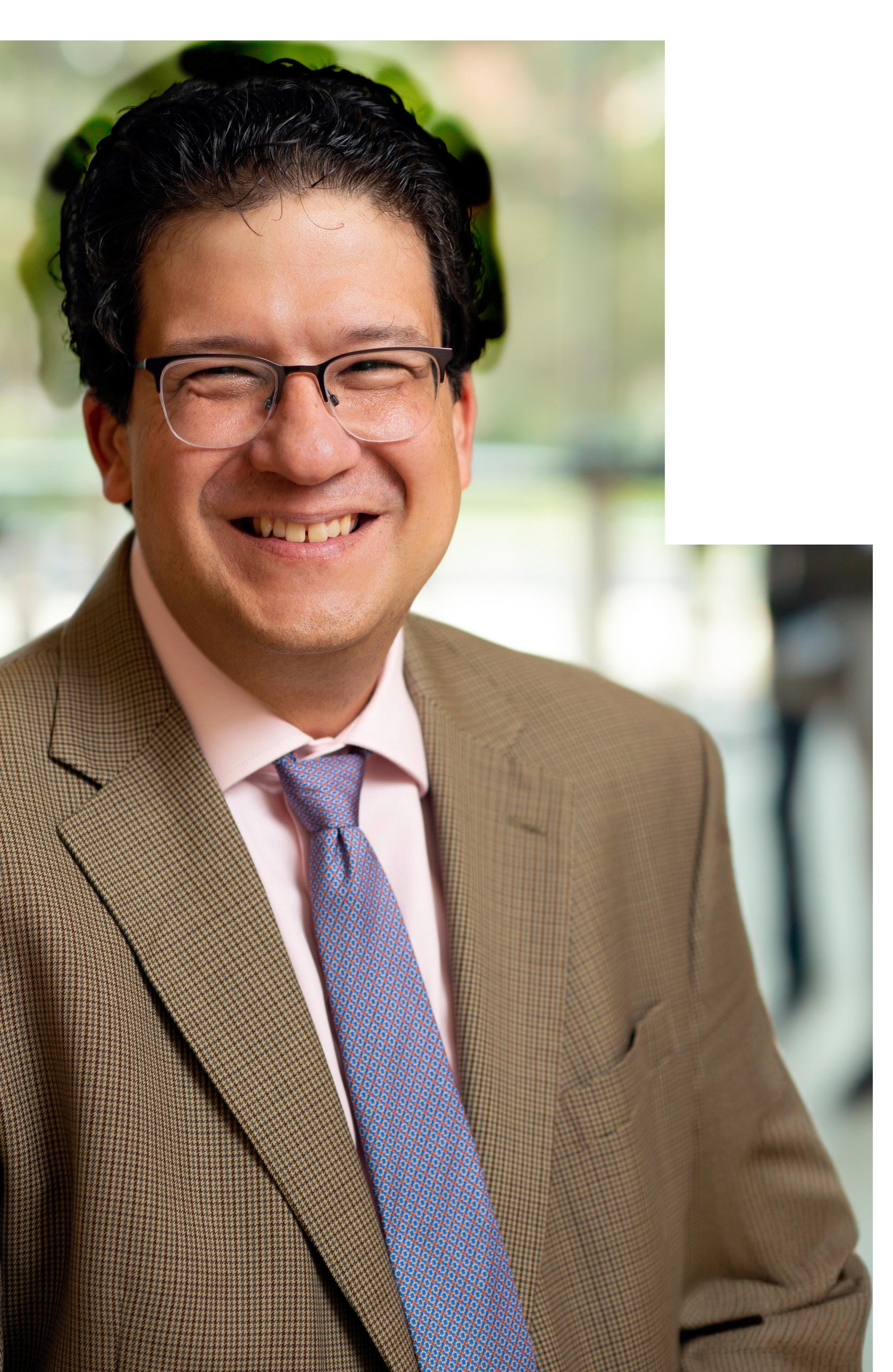
I am delighted to share a selection of this year’s stories of achievements and impact by our faculty, students, and alumni. Our faculty continue to excel and garner recognition for their contributions to the field of chemical engineering, with several faculty being elected as fellows of major professional societies. Our students and student groups similarly continue to excel, with two of our current Ph.D. students being awarded the National Science Foundation Graduate Research Fellowship and with our Chem-E-Car and ChemE Cube teams winning regional and national competitions. Two of our recent alumni share their experiences transitioning to entrepreneurship and academia. Finally, we are excited by the completion of the chemical engineering student center ground floor repair project and the start of the complete remodeling of the main chemical engineering building. It has been an
As I approach the end of my eighth year as chair of the Department of Chemical Engineering, I’ve reflected on what has been accomplished and what I would like to achieve in the next 10 years of my career. With support from the Herbert Wertheim College of Engineering leadership, the University of Florida, its Board of Trustees, and our state government, I’ve had the privilege of recruiting 15 new faculty, growing our ranks from 22 in 2017 to our current 28. Together, we were able to meet our research and teaching mission during the COVID-19 pandemic, and we’ve increased the size of our Ph.D. program while simultaneously increasing doctoral student stipends, resulting in a marked increase in research expenditures and output.
Most recently, we secured over $44 million in funding to modernize the department’s facilities and, with the help of the college, we’ve identified temporary laboratories to house our experiential learning courses and research programs. This will significantly reduce the time and total cost associated with the building renovation project by allowing us to completely vacate the chemical engineering building this summer. I am grateful for the opportunity to have served the department, college, and university during this exciting time.
However, while I am proud of these mutual accomplishments, I am increasingly interested in returning to a career focused on teaching and scholarship. For this reason, I will be stepping down from the role of department chair this summer. I look forward to continuing to contribute to our great institution through my research and scholarship and I am grateful to our colleague, Rich Dickinson, Ph.D., for accepting the role of interim department chair starting this fall.
Sincerely,
Carlos M. Rinaldi-Ramos, Ph.D. Department Chair and Dean’s Leadership Professor
Warren Dixon, Ph.D.
Interim Dean, Herbert Wertheim College of Engineering
Carlos M. Rinaldi-Ramos, Ph.D.
Department Chair and Dean’s Leadership Professor
Advisory Board Members
Zoe Barinaga
VR Basker
Chris Birdsall
Dane Boyington
Sheila Boyington
Darren Burgess
Steve Carson
Ray Cocco
Albert DaCosta
London Dewey
Mike Dickinson
Mary Jakab
Wayne Johnson
Steven Johnston
Marie Kane
William McGrane
Alex Moreno
Jennifer Schutte
Bryan Wilson
Jiancheng Yang
Allison Logan, M.A.
Creative Director & Designer
Dave Schlenker
Communications Manager
Ada Lang
Marketing & Communications Specialist
Herbert Wertheim College of Engineering Department of Chemical Engineering UNIVERSITY of FLORIDA
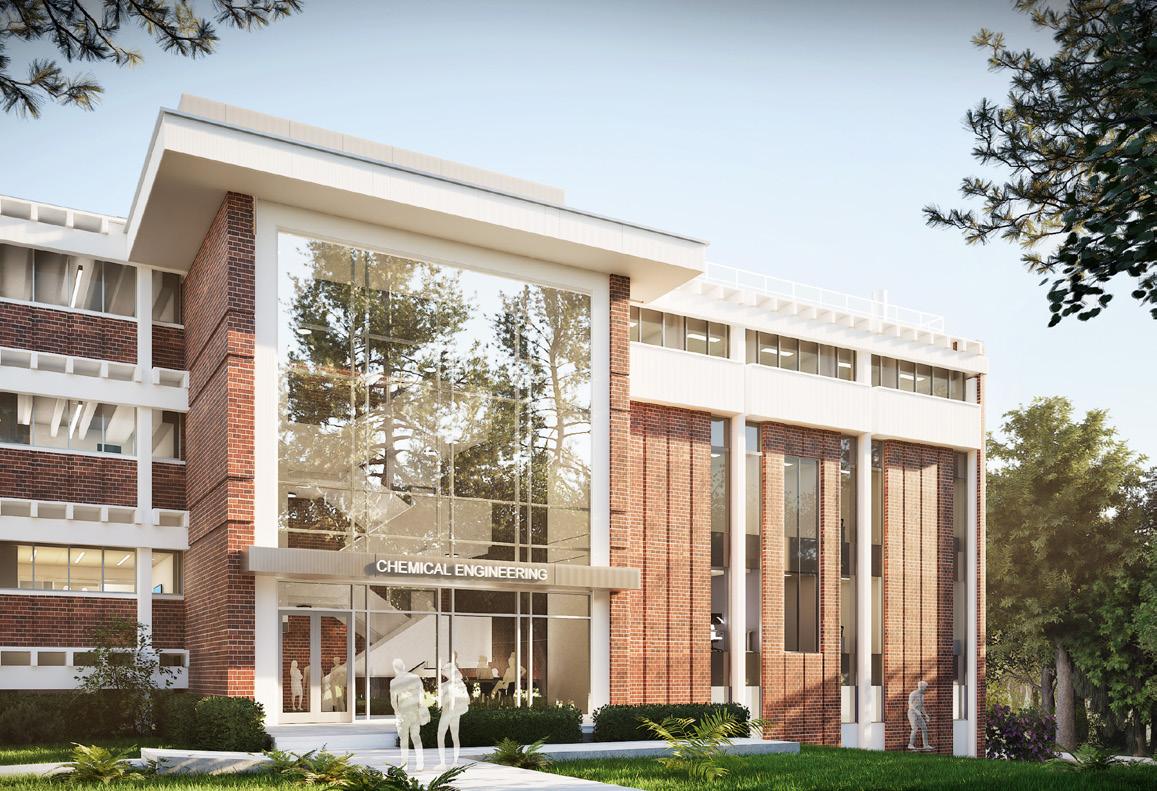
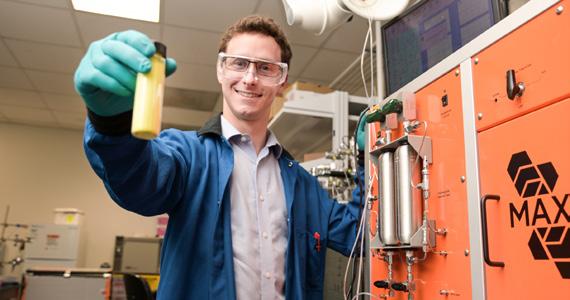
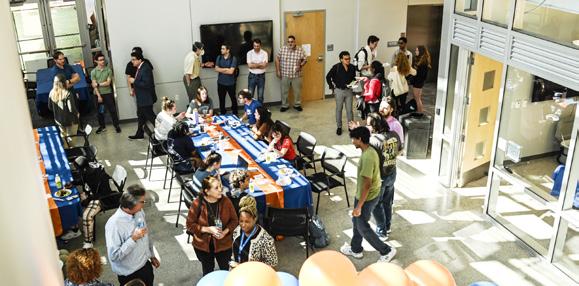
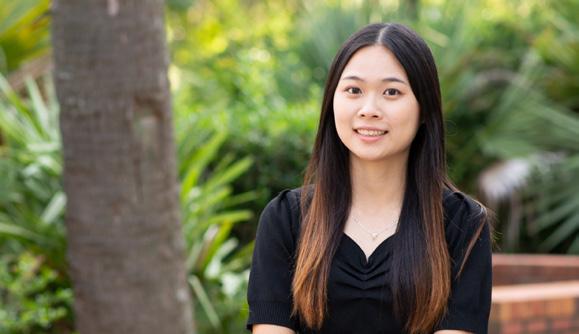

ALUMNUS SHARES LESSONS IN GRIT, GROWTH AND GIVING BACK PAGE 26
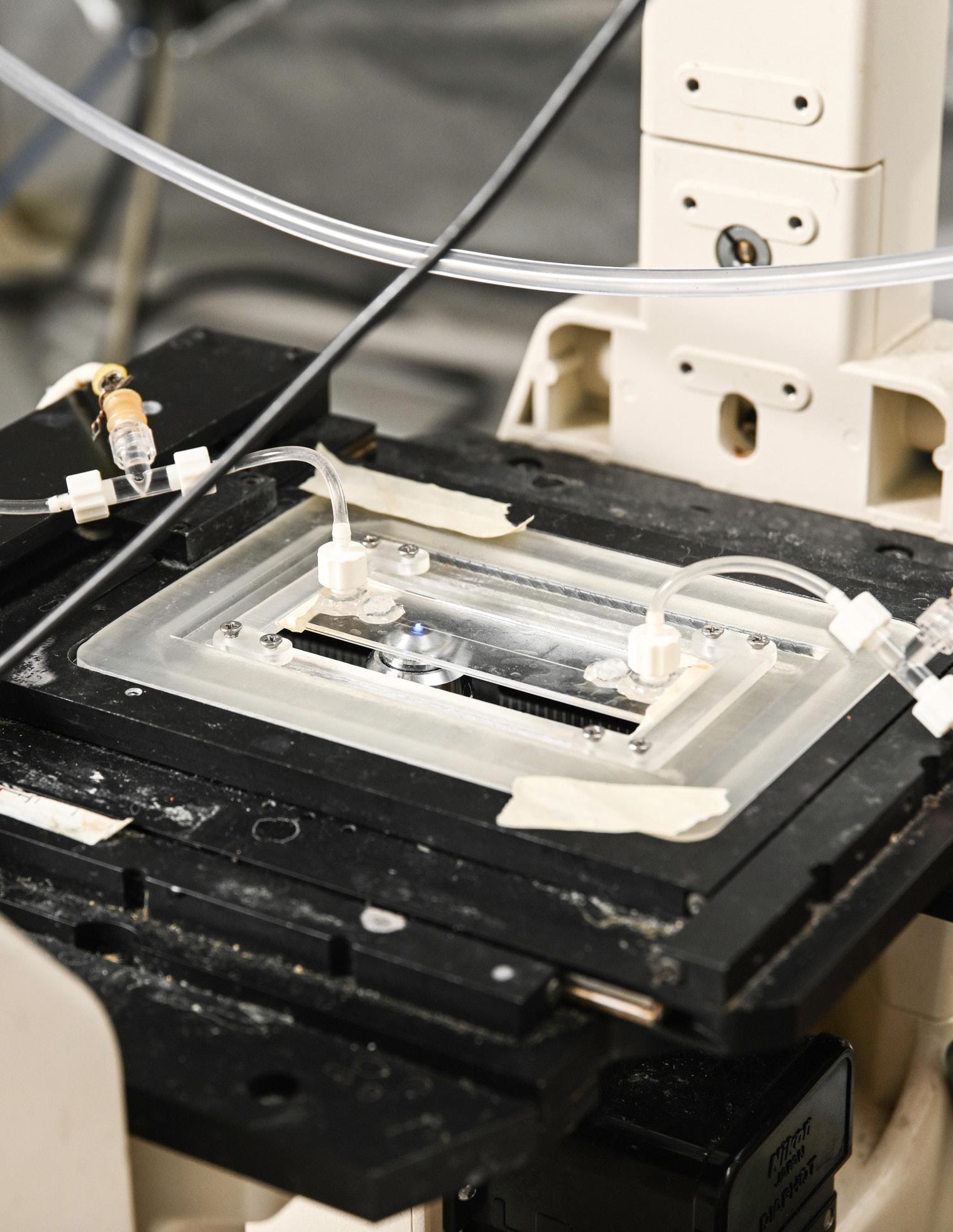
Close-up image of the purification device.
BIG IMPACT
UF RESEARCHERS DEVELOP LAB-ON-A-CHIP DEVICE FOR DNA PURIFICATION
By Ada Lang
When you think about scientific research, you probably envision a sterile room that houses gleaming beakers, rows of pipettes and centrifuges. But what if you could house a lab on a chip?
Call it the science of small, but a trio of University of Florida chemical engineers have developed a lab-on-a-chip process that could make a big difference for DNA research and, ultimately, patients.
Microfluidic technology miniaturizes complex laboratory processes — such as mixing, reactions, separations, etc. — into devices the size of a microscope slide. The UF team, consisting of Jason Butler, Ph.D., and Tony Ladd, Ph.D., both chemical engineering professors, along with their fourth-year Ph.D. candidate and research assistant, Jiayi Wang, have developed a microfluidic device for DNA purification that could speed up analysis of laboratory samples and match or exceed the purity of existing methods.
In their paper “Microfluidic Purification of Genomic DNA,” the team detailed their new device, which extracts genomic DNA without centrifuges, magnetic beads or gels. The paper was published in early spring in the “Proceedings of the National Academy of Sciences (PNAS).”
Purification removes contaminants from DNA samples, ensuring the integrity of the genetic material and providing more accurate results.
To purify DNA, individual cells must be broken open, proteins and other contaminants removed, and the purified DNA recovered. Current extraction protocols often break the DNA molecules into small fragments, due to stresses from centrifuging or from the tension of a flowing fluid pulling on tethered DNA molecules. Butler and Ladd think their microfluidic protocol is gentler and will reduce DNA fragmentation.
The groundwork for this new device began in 2006 with contributions from several different Ph.D. students, but “it was Jiayi who succeeded in the critical steps of extracting the purified DNA and demonstrating its purity by standard biochemical assays,” Ladd said. “She deserves a lot of credit for her persistence in overcoming many obstacles.”
Their device — the size of a microscope slide — uses fluid flow and electric fields to push contaminated DNA solutions through a channel about 100 microns square, or roughly the size of a human hair. The fluid flow distorts coiled DNA into elongated shapes, enabling the electric field to push them toward the channel walls.
“The DNA moves to the walls of the channel and builds up, while
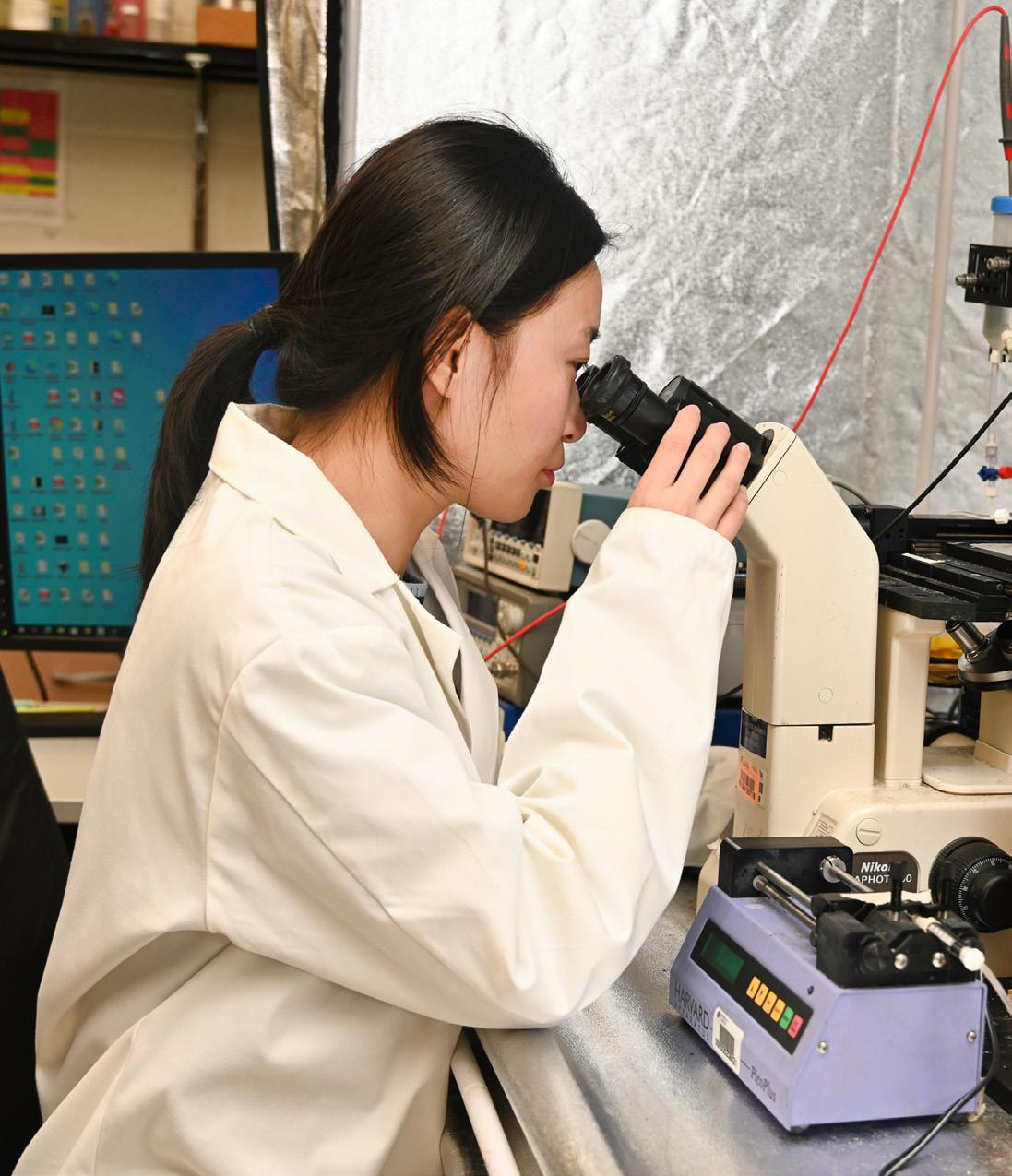
Jiayi Wang, a fourth-year Ph.D. candidate and research assistant, looks through a microscope.
all other components in the sample are carried away by the fluid flow,” said Butler.
How does this research fit into the bigger picture?
“DNA sequencing can be used to identify diseases, such as cancer,” Butler explained. “Long-read sequencers can recognize regions of the genome that are hard to identify from short sequences but are suspected to be associated with cancer.”
Given the ease of sample preparation, microfluidic extraction will likely lead to wider adoption of long-read sequencers, which sequence DNA in long strands without breaking them into smaller fragments.
Wang graduated in May, but her work will continue.
“The most valuable lesson from this experience was learning how to tackle challenges while maintaining a positive attitude, even in tough situations,” she said. “These experiences gave me the confidence to pursue a research position after graduation.”
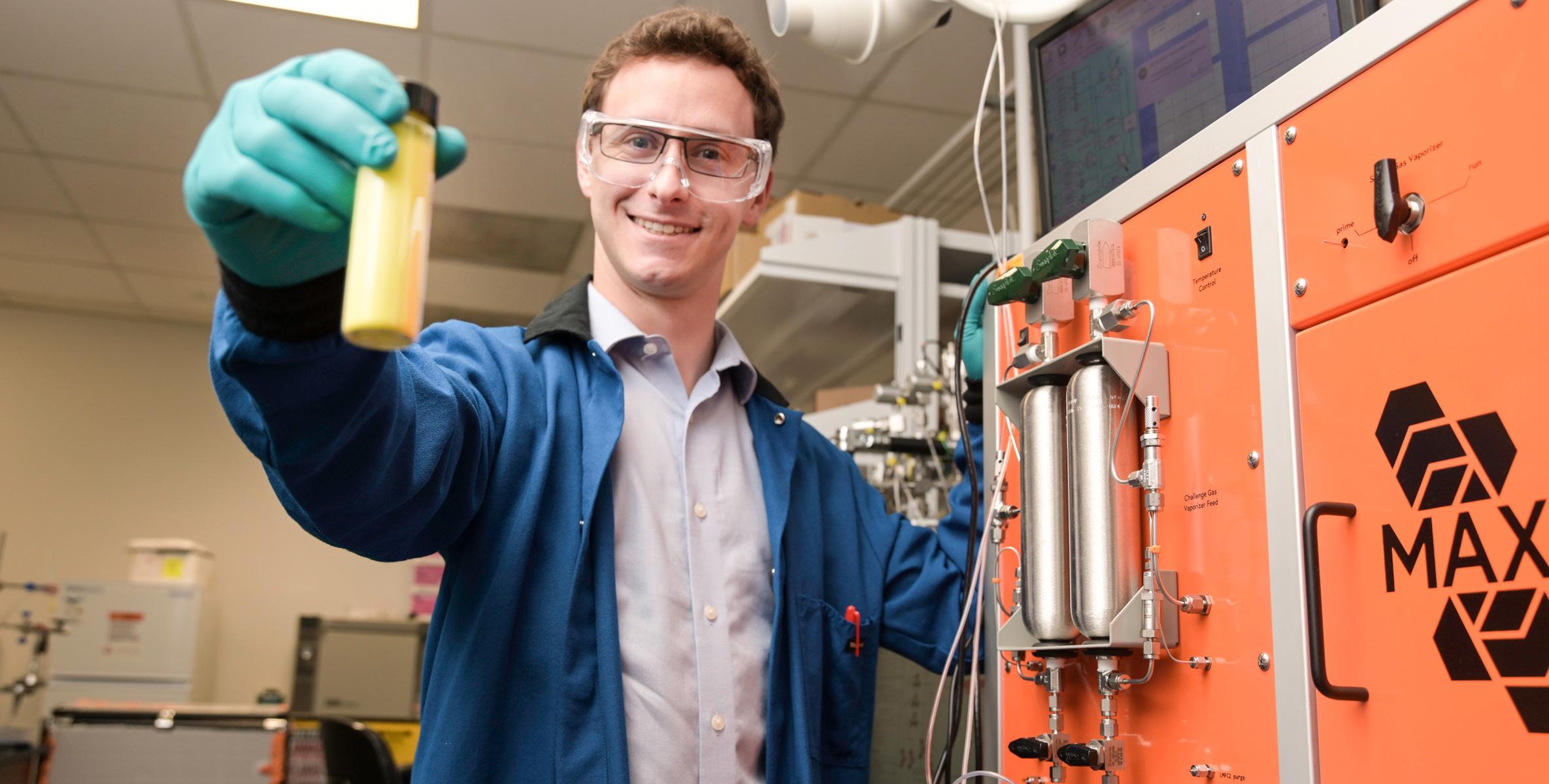
MOON COMES FULL CIRCLE
WITH NSF CAREER AWARD
By Dave Schlenker
As a kid in Memphis, Joshua Moon hoped his love for math and science would translate to a career in cutting-edge technology. Now with a Ph.D. and a position as an assistant professor in the Department of Chemical Engineering, he is the one creating that technology.
In fact, he recently won a coveted National Science Foundation Early CAREER Award, the foundation’s premier honor recognizing rising academic leaders.
“As a kid growing up without cable, I watched PBS shows when I came home from school,” he said. “They would show the NSF logo, and a voiceover would say ‘This episode was sponsored in part by the National Science Foundation (NSF) — supporting America’s investment in the future.’ I wondered what this mystical science organization did. I had no idea, but I was at least grateful they enabled me to watch my favorite shows. I’m really honored they are continuing to support that investment they started with me many years ago.”
The award will support Moon’s research on membrane-based separation processes and creating new ways to reduce energy consumption through chemical engineering.
Here is more information on one of ChE’s brightest stars.
> COULD YOU SUMMARIZE YOUR RESEARCH PROJECT?
Chemical separations are responsible for around 10% of the entire U.S. energy consumption, and transitioning to membrane-
based separations can potentially reduce that by as much as 90%. The project is focused on developing more efficient gas separation membranes and understanding how they work at a molecular level.
Think about if you fill a rubber balloon with helium and leave it for a few days; why does it deflate? The helium permeates through the rubber in the balloon. We’re trying to understand how that permeation process takes place at the molecular level and how we can make new materials that allow us to control that process.
> ULTIMATELY, HOW WILL THIS WORK HELP PEOPLE?
Since this project will hopefully lead to more efficient technologies for chemical separations, these could be used to make energy sources and commercial products like plastics cleaner and cheaper for everyone.
Another big part of the project is developing new outreach activities for middle and high school teachers across Florida and developing a new program to improve safety education at the college and pre-college level. We hope that teachers across Florida can implement practical science demos on sustainability in their classrooms to introduce more students to STEM.
> WHAT WAS YOUR REACTION TO WINNING THE CAREER AWARD?
Honestly, I kept doing a double take to make sure it was real. I
was also grateful the United States has continued investing in early career researchers like me through NSF.
> WHAT ARE YOUR OTHER RESEARCH PROJECTS?
I recently published a research paper with one of my Ph.D. students and a couple undergraduate researchers on facilitated transport membranes. This is another way of capturing carbon dioxide that uses chemical reactions to enhance the membrane’s ability to separate CO2. We have an ongoing project looking at how absorbed CO2 interacts and diffuses inside a membrane at the microscopic level and plan to publish some new findings soon.
I’m also collaborating with Austin Evans, Ph.D., [assistant professor in the UF Department of Chemistry]. Essentially, we’re trying to create membranes that are 10-100x thinner than a hair, which have molecule-sized channels that can “sieve” one type of gas molecule from another.
> WHAT BROUGHT YOU TO UF?
My Honda Civic.
Actually, it was the collaborative research culture. UF has over 30 faculty members just studying polymers for all different sorts of applications, and it’s exciting to be a part of an interdisciplinary research community where people look forward to working together to solve big problems.
> WHAT ARE YOUR FAVORITE THINGS AT UF/IN GAINESVILLE?
I really like the energy of college towns. I like trying out new coffee shops and restaurants, and there are some good ones here in town. I also joined a running club, TeamFTC, which has been a really welcoming community for me.
Also, the fact that there are no snowstorms is nice.
> WHAT POP CULTURE ARE YOU TUNING INTO THESE DAYS?
I’ve been enjoying “Severance.” I also love high-fantasy book series like “Lord of the Rings.” It’s cool to see how different writers approach worldbuilding.
ELECTS RINALDI-RAMOS TO 2024 CLASS OF FELLOWS AMERICAN INSTITUTE OF CHEMICAL ENGINEERS
By Ada Lang
Carlos Rinaldi-Ramos, Ph.D., chair of the Department of Chemical Engineering and Dean’s Leadership Professor, was elected a 2024 Fellow of the American Institute of Chemical Engineers (AIChE). The honor, awarded at AIChE’s annual conference in San Francisco, recognizes Rinaldi-Ramos’s outstanding service to the profession and his significant contributions to advancing chemical engineering.
As chair, Rinaldi-Ramos has led the strategic development of the department, overseeing two multi-million-dollar facility renovations to enhance research and educational spaces. Under his leadership, the department has hired 15 new faculty since 2018, growing to 28 current faculty. This has transformed the department by expanding the breadth of research and enhancing educational offerings.
Rinaldi-Ramos’s research focuses on magnetic nanoparticle technology, particularly in biomedical applications, where his team investigates nanoparticle stability, mobility in biological environments, and magnetic properties. Their work is pioneering new applications in cancer therapy and magnetic particle imaging (MPI), a cutting-edge imaging modality that enables the tomographic, quantitative evaluation of magnetic nanoparticles in living subjects. MPI holds transformative potential for cancer treatment and cell tracking in immunotherapies.
Rinaldi-Ramos’s dedication to the field extends beyond research and teaching. He has played a key role in AIChE, notably as chair of its Minorities Affairs Committee, which he helped

Alan Nelson, Ph.D., left, president of AIChE, and Darlene Schuster, right, former CEO of AIChE, present Carlos RinaldiRamos, Ph.D., with an AIChE Fellow certificate.
evolve into the Minority Affairs Community. This expansion allowed the group to better serve AIChE’s mission of workforce development.
Additionally, Rinaldi-Ramos has led the Southeastern Chemical Engineering Department Chairs Conference for three years, fostering collaboration and problem-solving among department chairs across institutions. His leadership in these roles reflects his commitment to mentoring and creating pathways for success within the chemical engineering community.
6 FACULTY HONORED WITH
By Ada Lang
In recognition of their academic excellence, the department awarded six faculty members three-year professorships (2024–2027), which provide supplementary funds to support teaching and research. The recipients were selected by a faculty advisory committee and approved by Carlos Rinaldi-Ramos, Ph.D., the department chair, and Forrest Masters, Ph.D., PE, former interim dean of the Herbert Wertheim College of Engineering.
Piyush Jain, Ph.D., Associate Professor
Jain was named holder of the Exxon Mobil Gator Alumni Faculty Endowment in Chemical Engineering. At his Nano Biomolecular Precision Lab, he and his team pioneer “the discovery and engineering of advanced biomolecular systems to enhance the precision and delivery of programmable genome-editing tools, such as CRISPR/Cas systems.”
> IN WHAT WAYS DOES THIS PROFESSORSHIP INSPIRE YOU TO FURTHER ENHANCE YOUR CONTRIBUTIONS TO THE COLLEGE AND THE BROADER ACADEMIC COMMUNITY?
This professorship reinforces my commitment to mentoring students and advancing UF’s reputation as a hub for chemical engineering innovation. It inspires me to organize impactful events, such as symposia that bring leading experts to campus, and to foster a collaborative environment where students, faculty and industry partners can thrive.
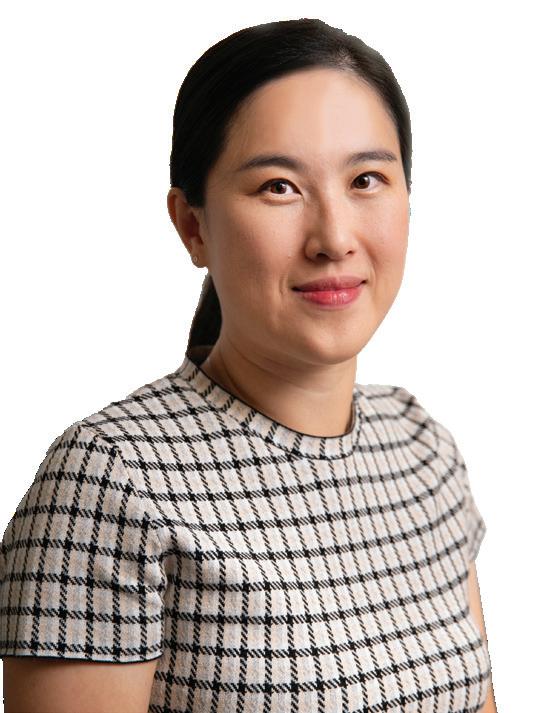
Yeongseon Jang, Ph.D., Assistant Professor
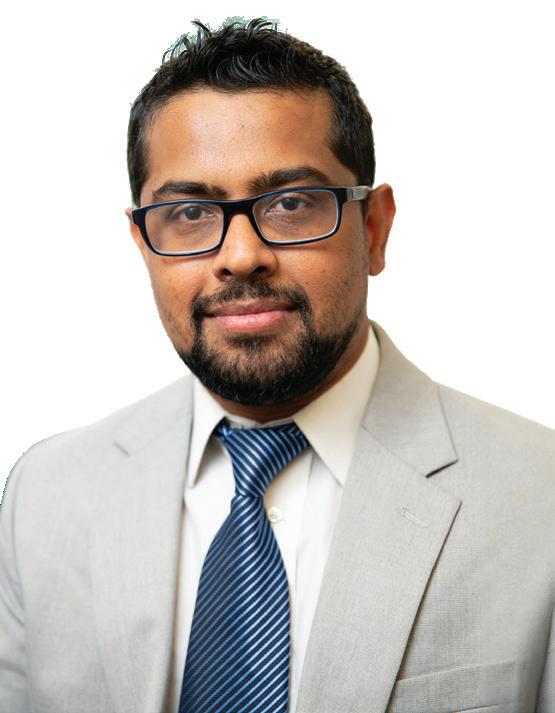
Jang was named holder of the Alex Moreno Rising Star Professorship in Chemical Engineering. Her lab focuses on developing “Soft Matter Assembly & Recombinant Technology (SMART) Approaches to create Bioinspired Materials that can serve as synthetic platforms recapitulating sophisticated living functions.”
> WHAT DOES RECEIVING THIS PROFESSORSHIP MEAN TO YOU PERSONALLY AND PROFESSIONALLY?
Receiving the Alex Moreno Rising Star Professorship is a significant honor. Personally, it represents recognition of the dedication and passion I have invested in my research and teaching. Professionally, it solidifies my role as an emerging leader in chemical engineering and motivates me to pursue ambitious research and educational initiatives.
Ranga Narayanan, Ph.D., Distinguished Professor
Narayanan was named holder of the Charles A. Stokes Endowed Professorship in Chemical Engineering. At his lab, the Nonlinear Instability and Bifurcation Laboratory (NIBL), they study transport phenomena and its applications to microgravity, material science and separation processes.
> IN WHAT WAYS DOES THIS PROFESSORSHIP INSPIRE YOU TO FURTHER ENHANCE YOUR CONTRIBUTIONS TO THE COLLEGE AND THE BROADER ACADEMIC COMMUNITY?
The Stokes Professorship inspires me to not only deepen my research but also to elevate my role as an academic leader. It motivates me to contribute to the college’s reputation by mentoring the next generation of scholars and engineers, fostering a collaborative and innovative environment, and engaging in outreach that highlights the societal impacts of our work.
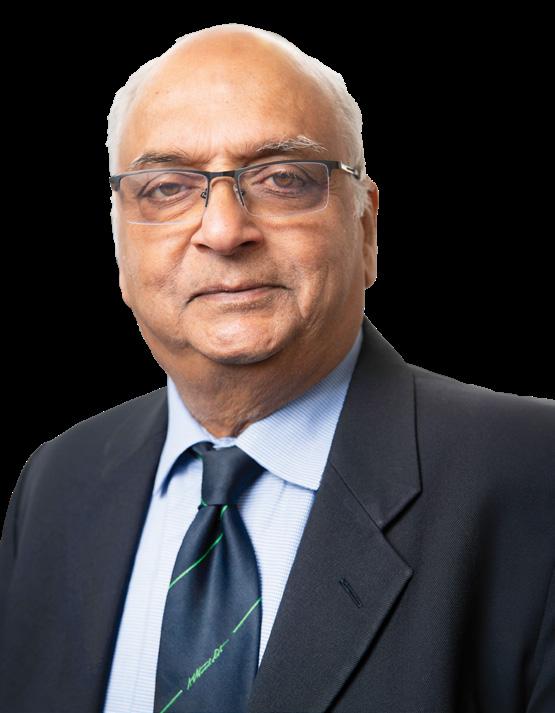
Read Full Story
WITH PROFESSORSHIPS
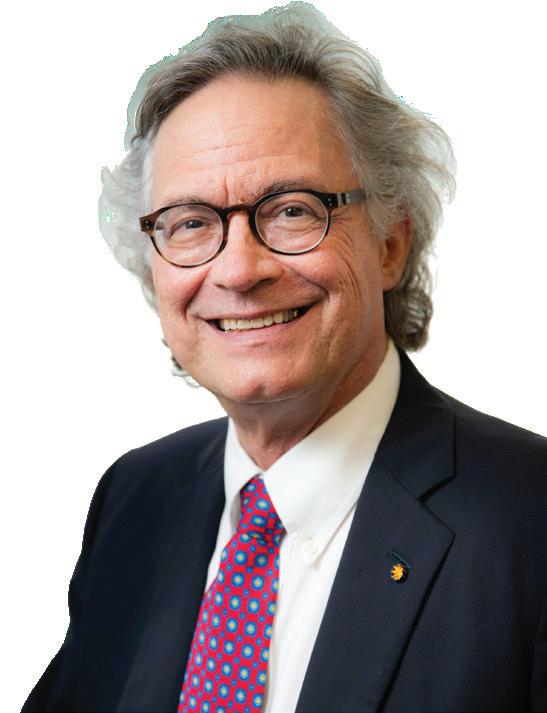
Mark Orazem, Ph.D., Distinguished Professor
Orazem, also the department’s associate chair for graduate studies, was named holder of the William P. and Tracy Cirioli Term Professorship in Chemical Engineering. His lab focuses on identifying possible mechanisms for localized corrosion of copper-clad steel containers, proposed for storage of spent nuclear fuel rods.
> HOW WILL THIS PROFESSORSHIP SUPPORT YOUR RESEARCH AND ACADEMIC GOALS IN THE COMING YEARS?
The funds provided will facilitate activities for which more restricted funds cannot be used. In addition to covering costs associated with my international travel, I envision using these funds to support the travel of students to conferences. It is important for the development of my students that they be exposed to outside research and to learn how to present themselves and their research to the scientific community.
Stoppel was named holder of the Dr. and Mrs. Frederick C. Edie Term Professorship in Chemical Engineering. Stoppel and her lab focus on “building dynamic and adaptable natural biomaterials that can be leveraged to alter the behavior of cells both in vitro and in vivo.” Their recent work focuses on utilizing silk from pantry moths (a.k.a. Indian meal moths or Plodia interpunctella) for medical applications.
> HOW WILL THIS PROFESSORSHIP SUPPORT YOUR RESEARCH AND ACADEMIC GOALS IN THE COMING YEARS?
The professorship directly supports my goals by providing resources to fund critical aspects of my research program, including professional development. This support will enable my lab to attend key conferences, publish impactful research, and host workshops to improve scientific communication. It will also support the expansion of my research program and efforts during my sabbatical, including establishing collaborations at Kyoto University. The professorship will also support our Stoppel Lab Creativity and Curiosity Retreats, which focus on new ideas driven by Ph.D. students.
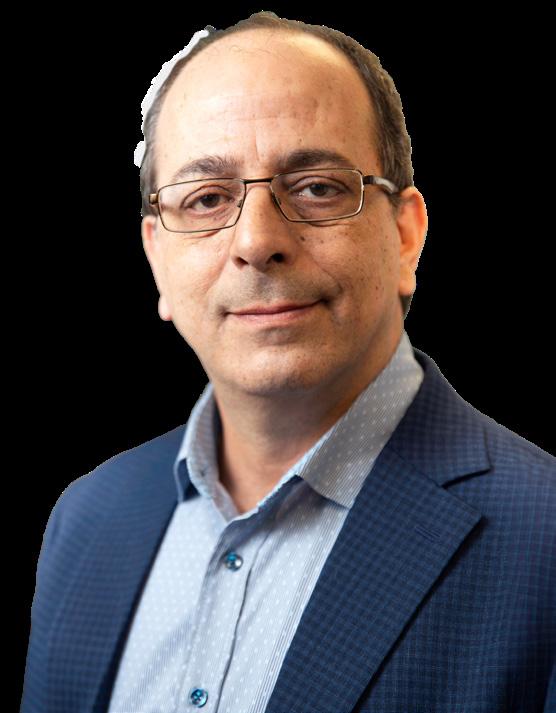
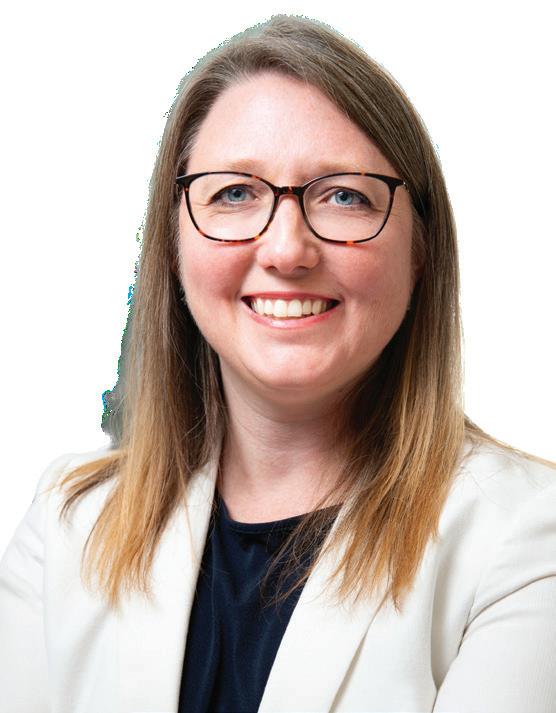
Weaver was named holder of the Dow Chemical Company Foundation Professorship in Chemical Engineering. His lab focuses on “the understanding of reactions occurring on solid surfaces on a molecular level.”
> HOW WILL THIS PROFESSORSHIP SUPPORT YOUR RESEARCH AND ACADEMIC GOALS IN THE COMING YEARS?
This professorship will play a critical role in advancing my research in alloy and oxide surface science and catalysis by enabling the exploration of novel surface reactions and catalytic mechanisms. It will provide resources for pursuing new directions, such as the design and study of trimetallic alloys and oxide-supported clusters for sustainable chemical processes. Additionally, the support will help facilitate student travel to national and international conferences, where they can present their work, gain valuable feedback and engage with leading scientists. It will also allow students to visit advanced research facilities, such as synchrotron light sources, to conduct experiments critical to their projects. These opportunities are invaluable for fostering their growth as independent researchers and for strengthening our group’s contributions to the field.
Whitney Stoppel, Ph.D., Assistant Professor
Jason Weaver, Ph.D., Professor
National Academy of Inventors Recognizes 2 ChE Faculty Members
The department is proud to announce that two of its esteemed faculty members have been recognized by the National Academy of Inventors (NAI) for their outstanding contributions to innovation and research. These recognitions are a testament to the cutting-edge research and innovative spirit that defines our community.
FAN REN, PH.D.
Ren, a distinguished professor, was named a Fellow of the National Academy of Inventors.
Ren, who joined UF’s Herbert Wertheim College of Engineering in 1998, researches next-generation semiconductor electronic device fabrication technologies and advanced health sensors for events like heart attacks
The NAI Fellowship is the highest professional distinction awarded solely to inventors, and this year’s class comprises 170 exceptional individuals.
“This year’s class of NAI Fellows represents a truly impressive caliber of inventors. Each of these individuals are tackling real-world issues and creating solutions that propel us into the future. Through their work, they are making significant contributions to science, creating lasting societal impact, and growing the economy,” said Paul Sanberg, Ph.D., D.Sc. FNAI, president of the NAI.
PIYUSH JAIN, PH.D.
Jain, an associate professor and holder of the Exxon Mobil Gator Alumni Faculty Endowed Professorship, was named part of the 162 emerging academic inventors identified by NAI member institutions and welcomed to their 2025 class of Senior Members. This year’s class of Senior Members is the largest to date and come from 64 National Academy of Inventors member institutions across the nation.
Jain and his team created diagnostics and a comprehensive suite of precise genome-editing tools using CRISPR, a gene editing tool that allows scientists to modify DNA in living organisms. They have filed more than 40 patents, launched multiple startup ventures, and demonstrated how these innovations can potentially transform disease detection and treatment on a global scale. Last year they were awarded
Fan Ren, Ph.D., was named a Fellow of the NAI, joining an elite group of inventors who have made significant contributions to their fields. Meanwhile, Piyush Jain, Ph.D., was inducted as a 2025 NAI Senior Member, a distinction reserved for emerging academic inventors who are pushing the boundaries of innovation and research.
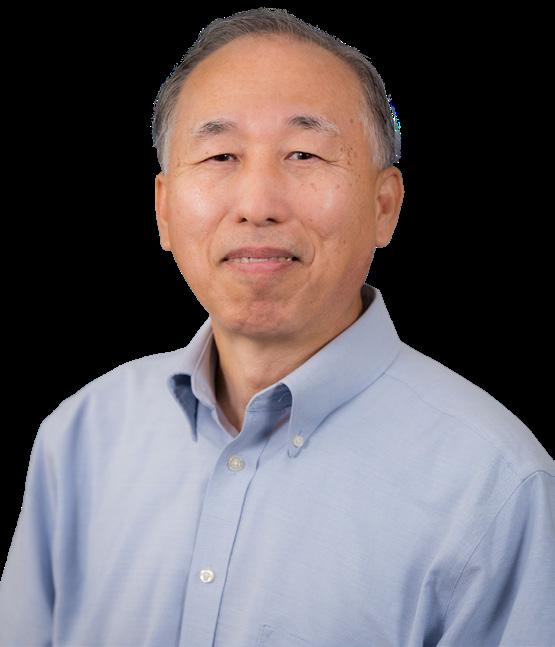
Ren is the recipient of the Gordon E. Moore Medal for Outstanding Achievement in Solid State Science and Technology and Albert Nerken Award in American Vacuum Society. He holds 31 U.S. patents and 13 foreign patents that have been licensed to four companies. He has published over 1,000 articles, seven books, and 56 book chapters and serves as a technical editor in ECs JSST, guest editors in ECS and AVS. He is a Fellow of American Institute of Chemical Engineers, American Institute for Medical and Biological Engineering, American Vacuum Society, American Physical Society, Electrochemical Society, Materials Research Society, IEEE and SPIE.
$2.8 million from the National Institutes of Health to develop an at-home HIV test kit that could save millions of lives.
“I am deeply honored to be recognized as a senior member of the National Academy of Inventors,” said Jain. “This distinction is a testament to the dedication of my research team, and I look forward to building on this momentum, ensuring that our breakthroughs not only expand scientific frontiers but also bring tangible healthcare solutions to those who need them most.”

NAI SENIOR MEMBER NAI FELLOW
2024-2025 SEMINAR SPEAKERS
FALL

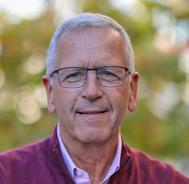
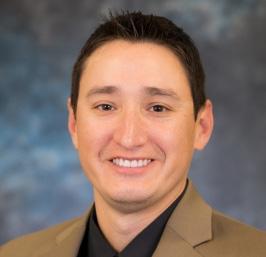
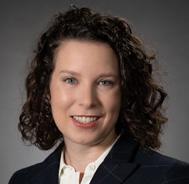
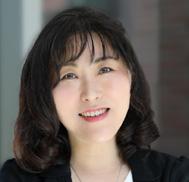

SPRING


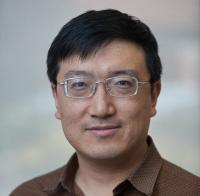

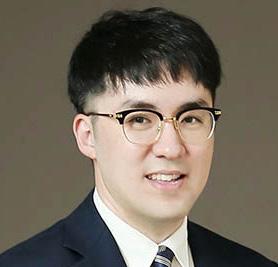
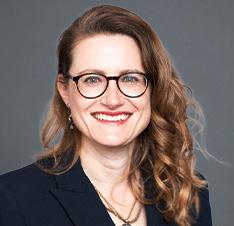

Selen Cremaschi, Ph.D. Auburn University
Joseph DeSimone, Ph.D. Stanford University
James Fleetwood UF Herbert Wertheim College of Engineering
Allison Godwin, Ph.D. Cornell University
Alissa Park, Ph.D. University of California, Los Angeles
Ryan Lively, Ph.D. Georgia Tech
Whitney Stoppel, Ph.D. University of Florida, Chemical Engineering
Janani Sampath, Ph.D. University of Florida, Chemical Engineering
Bin Wang, Ph.D. University of Oklahoma
Liliana del Pilar Castro Molano, Ph.D. Industrial University of Santander (UIS), Colombia
Joseph S. Kwon, Ph.D. Texas A&M University
Jodie L. Lutkenhaus, Ph.D. Texas A&M University
Eckart Meiburg, Ph.D. UC Santa Barbara


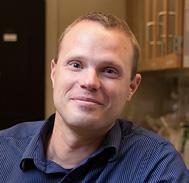
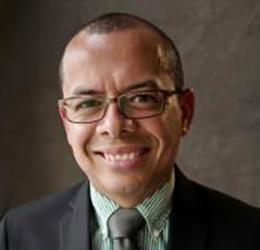
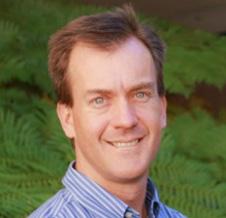
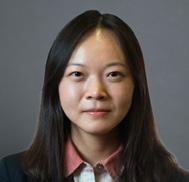



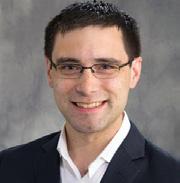

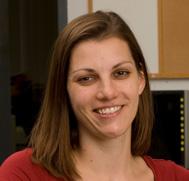

Josh Leonard, Ph.D. Northwestern University
Jean-Francois Louf, Ph.D. Auburn University
Bradley Olsen, Ph.D. Massachusetts Institute of Technology
Gerardo Ruiz-Mercado, Ph.D. U.S. Environmental Protection Agency
Todd Squires, Ph.D. University of California, Santa Barbara
Shuya Wei, Ph.D. University of New Mexico
Kristala Prather, Ph.D. Massachusetts Institute of Technology
Wyatt Shields, Ph.D. University of Colorado, Boulder
Qing Shao, Ph.D. University of Kentucky
Charles Sing, Ph.D. University of Illinois at Urbana-Champaign
Petia Vlahovska, Ph.D. Northwestern University
Rebecca Kuntz Willits, Ph.D. Northeastern University
You-Yeon Won, Ph.D. Purdue University, West Lafayette
DISTINGUISHED LECTURE SERIES
DINESH O. SHAH ANNUAL LECTURER IN SURFACE SCIENCE
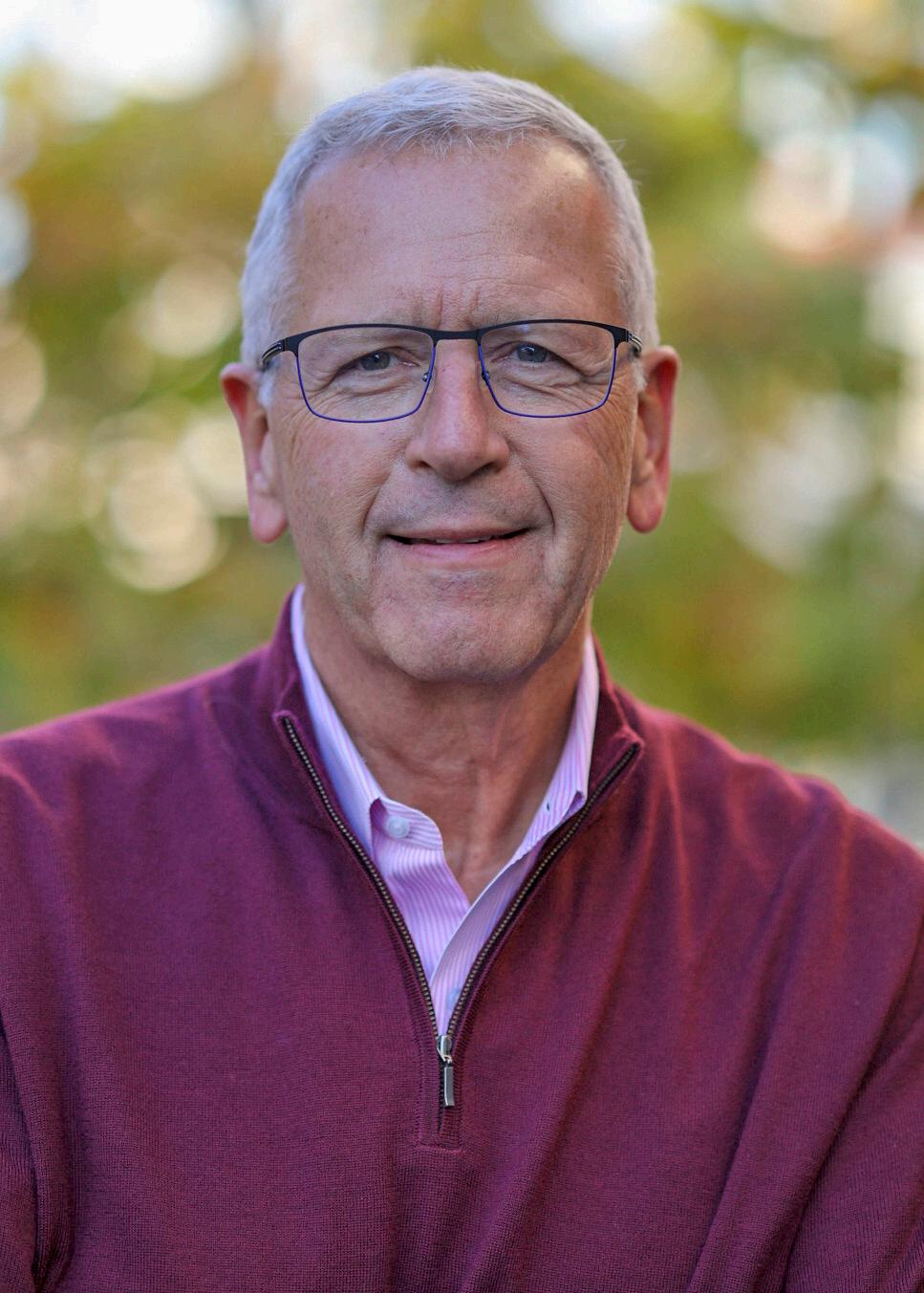
Joseph M. DeSimone, Ph.D., was the 2024 Dinesh O. Shah Annual Lecturer in Surface Science. He presented “The Delicate Interplay Between Light, Interfaces and Design: The Complex Dance that Allows 3D Printing to Scale to Manufacturing.”
DeSimone is the Sanjiv Sam Gambhir Professor of Translational Medicine and Chemical Engineering at Stanford University. Previously, DeSimone was a professor of chemistry at the University of North Carolina at Chapel Hill and of chemical engineering at North Carolina State University. He is also co-founder and former CEO (2014-2019) of the 3D-printing company Carbon.
DeSimone is responsible for numerous breakthroughs in areas including green chemistry, polymer synthesis, medical devices, nanomedicine and 3D printing. He has published over 350 scientific articles and holds 240 patents. In 2016, DeSimone was recognized by President Barack Obama with the National Medal of Technology and Innovation. He is one of only 25 individuals elected to all three branches of the U.S. National Academies (Sciences, Medicine, Engineering).
DeSimone received his B.S. in Chemistry in 1986 from Ursinus College and his Ph.D. in Chemistry in 1990 from Virginia Tech.
The Dinesh O. Shah Annual Lecture in Surface Science was established in the department by Dinesh O. Shah, Ph.D., because of his strong commitment to the university and the field of surface science. Shah retired in 2005 from UF after a distinguished academic career.
ENDOWED DISTINGUISHED LECTURER IN FLUID MECHANICS
Ekhart Meiburg, Ph.D., was the 2025 Endowed Distinguished Lecturer in Fluid Mechanics. He presented, “Fluid Mechanics of the Dead Sea: Rise of the Salt Giants.”
Meiburg received his Ph.D. in Mechanical Engineering from the Technical University of Karlsruhe, Germany, in 1986. After a postdoctoral stay at Stanford University and faculty appointments at Brown University and the University of Southern California, he joined UC Santa Barbara in 2000, where he currently is a distinguished professor of Mechanical Engineering.
He is a recipient of the NSF Presidential Young Investigator Award and the Humboldt Senior Research Award, a fellow of the American Physical Society and the American Society of Mechanical Engineers, a past chair of the Division of Fluid Dynamics of the American Physical Society, and he serves as Associate Editor for Physical Review Fluids.
His research interests lie in the general area of fluid dynamics and transport phenomena, with a focus on multiphase and environmental fluid mechanics.

From left: Ranga Narayanan, Ph.D., Ekhart Meiburg, Ph.D., and Carlos M. Rinaldi-Ramos, Ph.D.
AFTER MAJOR RENOVATION STUDENT CENTER REOPENS

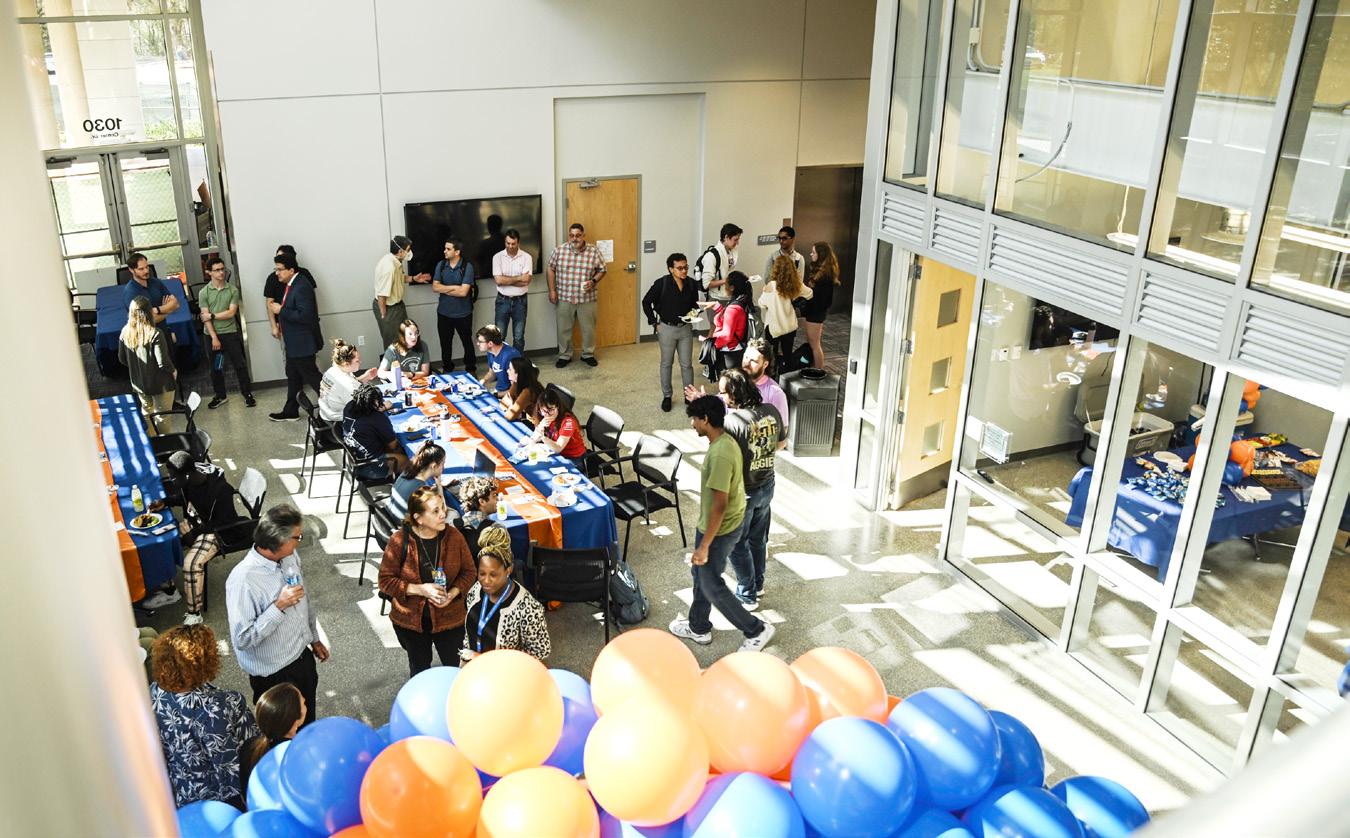
By Ada Lang
UF Chemical Engineering students, faculty and staff celebrated the reopening of the newly renovated Chemical Engineering Student Center. Carlos Rinaldi-Ramos, Ph.D., department chair, took a few moments to explain the background of the building, as well as future plans to remodel the entire chemical engineering building.
The Student Center was first opened on Oct. 4, 2013, after 10 years of planning and fundraising. It was funded entirely by private donations, totaling $3.9 million. The nearly 10,000-squarefoot building is located on the south side of the main chemical engineering building and has served as the heart of department activities for years. Unfortunately, the Student Center ground floor was closed in Spring 2017 due to problems with the concrete slab.
It once housed the administrative and advising offices on the second floor and the light-filled first floor was the scene of design and poster events, student group activities and department events. Additionally, there are niches around the building that were used by students for studying and practicing presentations.
Insurance covered some of the costs, but the project was delayed, mainly due to the pandemic, and as a result, the original estimates exploded due to supply shortages and rising prices. However, Rinaldi-Ramos explained that for the past eight years, he has worked with staff and college administration to secure additional funding to repair and reopen the space.
The University of Florida invested $2.5 million to repair the first floor. An additional $400,000 will be used to remodel the second-floor offices to provide space for faculty and doctoral students, who will relocate to make way for the upcoming ~$40 million renovation of the main chemical engineering building.
Rinaldi-Ramos spoke highly in his praise of both the university and donors who made the remodeling of the beloved building a reality, particularly David Sante, the department’s facilities manager, who was the department’s liaison during the long process.
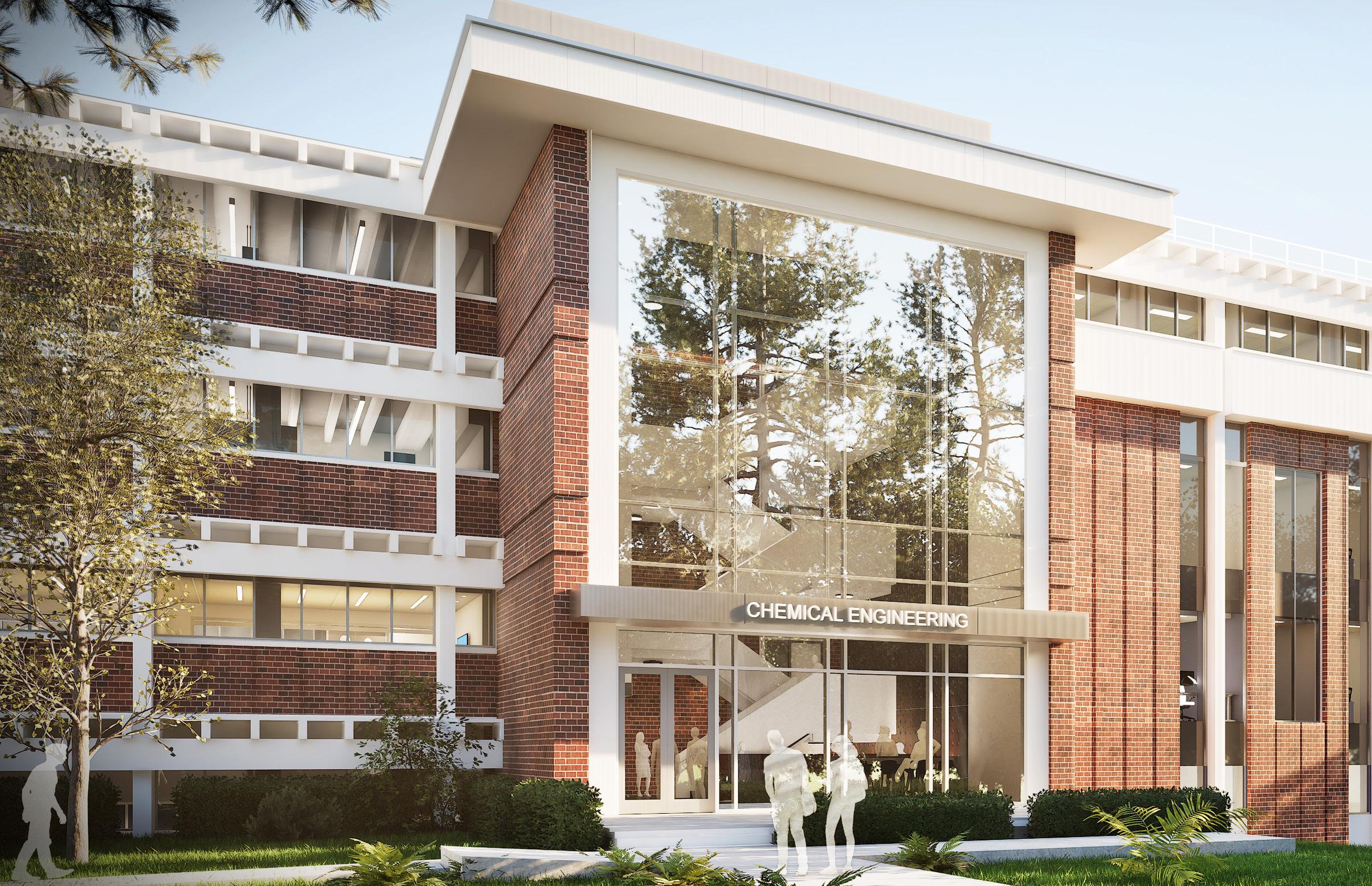
A BLUEPRINT FOR
THE FUTURE
CHEMICAL ENGINEERING UNDERGOES $40 MILLION TRANSFORMATION
By Ada Lang
If you’ve been near the University of Florida’s Department of Chemical Engineering in recent months, you’ve likely noticed moving trucks, gigantic boxes and hand carts stacked with supplies.
What is going on?
Well, thanks to over $40 million provided by the state of Florida, the ChE building is being emptied and remodeled. Labs and offices are being relocated, and construction will begin soon on the 50-plus-year-old building’s long-anticipated remodel.
Built in 1969, the building’s red brick facade, short windows, exterior stairs and concrete accents reflect its age. The interior, with its freight elevator and dark hallways, belies the important
work happening in the labs. According to department chair Carlos Rinaldi-Ramos, Ph.D., a lot has changed since 1969 with research areas, instrumentation and safety associated with chemical engineering research.
“This remodeling project will completely replace utilities, such as water and plumbing, to meet current standards,” he said. “We will vastly increase fume-hood capacity per laboratory, which will support safety in research and enable work in important areas like materials synthesis and reaction engineering. The addition of a building autoclave will enable biomolecular engineering research not currently feasible in the building.”
Additionally, the first floor will house a pre-Good Manufacturing
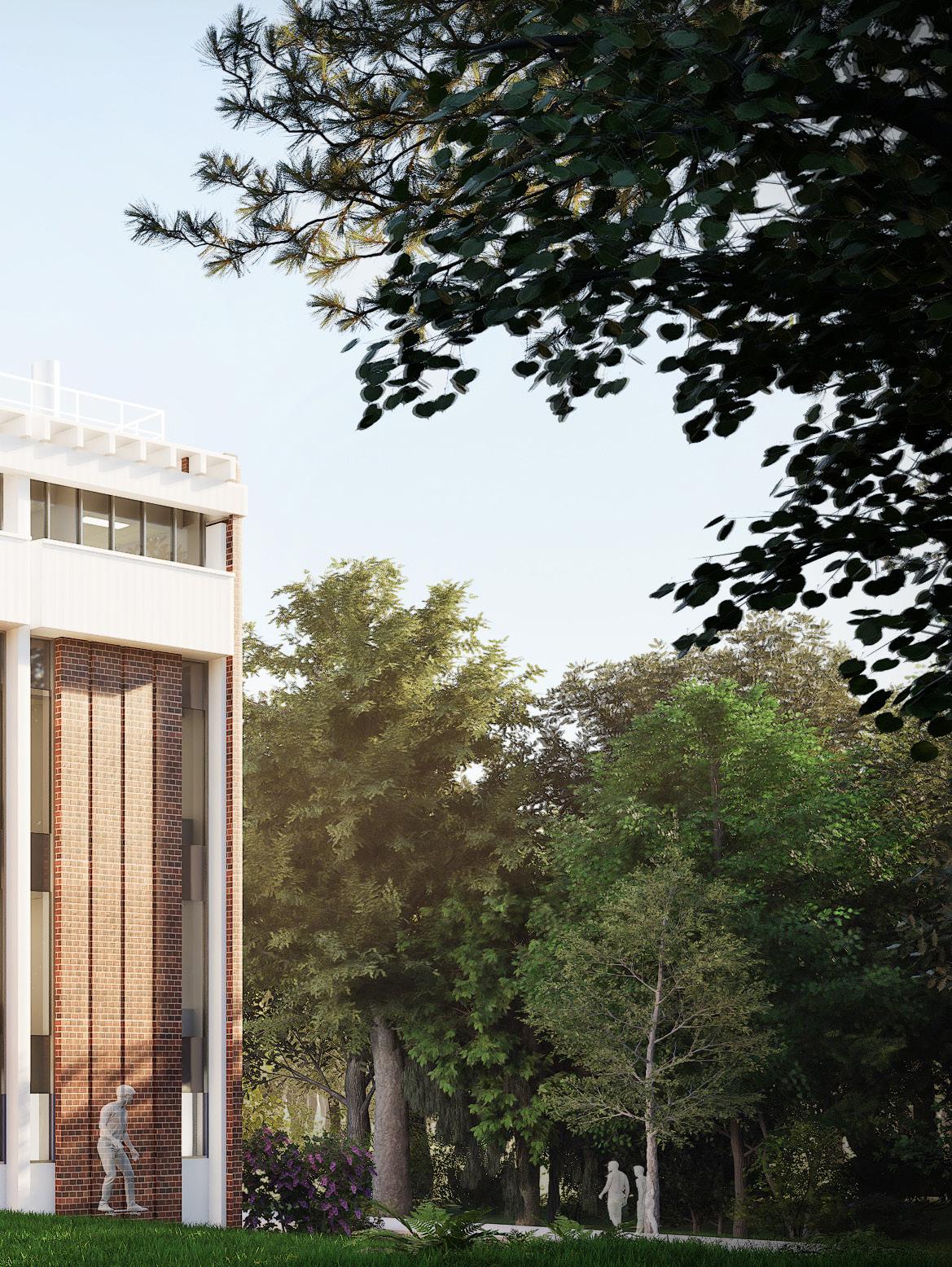
Practices laboratory that will enable researchers throughout UF’s Herbert Wertheim College of Engineering to evaluate synthesis and production of biomolecules and biomaterials under conditions that approach those used for the manufacturing of clinical products. This effort is led by Greg Hudalla, Ph.D., an associate professor and the Integra LifeSciences term professor in biomedical engineering.
“Overall, this will greatly expand research capacity, and the facilities will reflect the excellence of the research conducted by our faculty and students, which we believe will help us recruit and retain the best talent,” Rinaldi-Ramos added.
The new research spaces mesh with the department’s long-term goals and academic priorities by:
• Expanding the ability to perform research at the edge of the chemical engineering discipline
• Modernizing the experiential learning laboratories
• Providing exciting opportunities for undergraduate and graduate students to apply what they learn in the classroom using new experimental equipment that reflects chemical engineering concepts and real-world applications
In addition to new and modernized labs, the project will refurbish the main entry and exterior stairs. The north entrance will be enveloped in a two-story atrium entry to create a lightfilled lobby with a new elevator. The new Unit Ops Laboratory (UOL) will be on the second floor and have glass walls facing the corridors. Additionally, there will be two new teaching

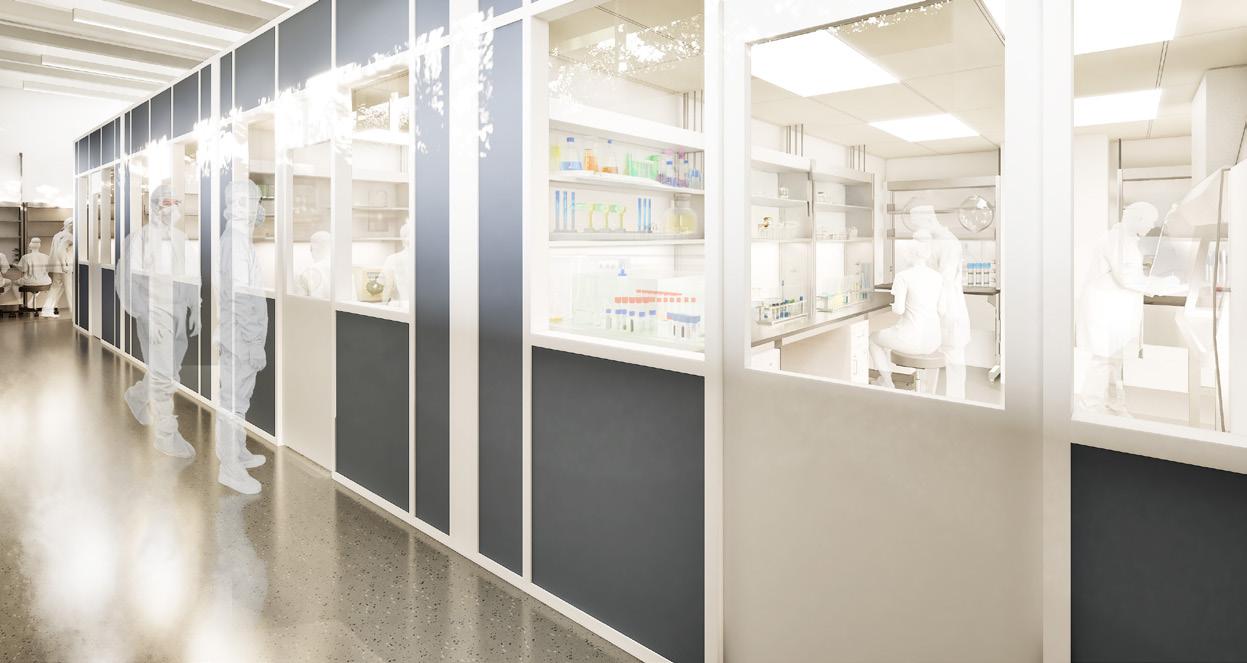
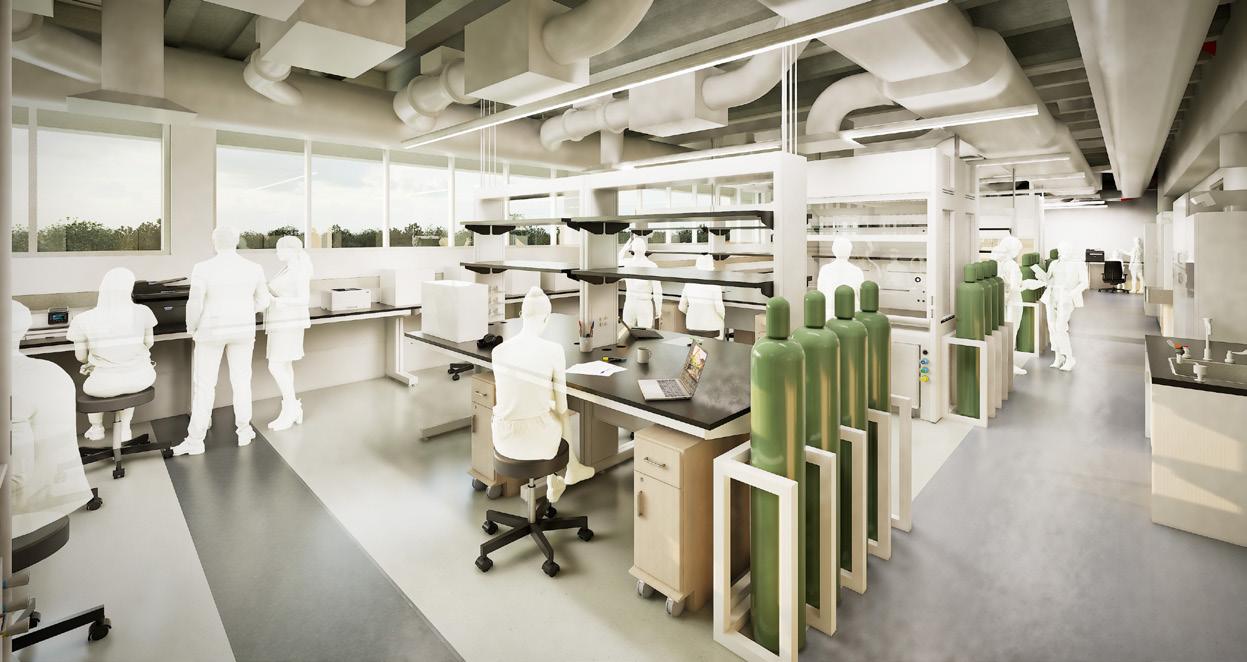
laboratories dedicated to biomolecular engineering and advanced manufacturing.
The building also will house study spaces and a lounge for students and faculty, as well as faculty office spaces. The department administration offices will be on the second floor (at the west end of the building) in the space currently housing the UOL. Flex spaces can be used for advisory board and faculty meetings.
Due to the anticipated two-year remodeling, all research laboratories and the UOL will be temporarily relocated to other buildings.
Thanks to a generous $500,000 investment by the college, the UOL has been relocated to the Nuclear Sciences Building and is now equipped with a suite of new hands-on teaching modules. This investment will improve student learning and better prepare graduates for the job market.
North Entry
View of the student village.
View of 1st Floor pre-Good Manufacturing Practices Lab
View of Open Concept Laboratory (3rd and 4th Floors)
“The new, state-of-the-art equipment includes a chromatography unit and a tangential flow filtration unit. These specific units are used in bioprocessing separations, such as separating waste proteins out of vaccines,” said LiLu Tian Funkenbusch, Ph.D., an instructional assistant professor in the department.
Once remodeling is complete, the UOL will move to the newly renovated space on the second floor, co-located with the department’s administrative and academic offices, and the planned Biomolecular Engineering and Advanced Chemical Engineering teaching laboratories.
The new hands-on learning equipment, Rinaldi-Ramos said, “will provide experiences where students apply what they learn in the classroom using modern equipment that reflects the breadth of chemical engineering jobs in industries ranging from fine chemicals and energy to food and beverages, personal care products, semiconductor manufacturing, and biotechnology/biopharmaceuticals. Modern facilities that provide opportunities to learn and research safely and collaboratively are critical to attracting and retaining the best talent, be it faculty or students.”
View More Renderings
A BRIEF HISTORY OF THE DEPARTMENT
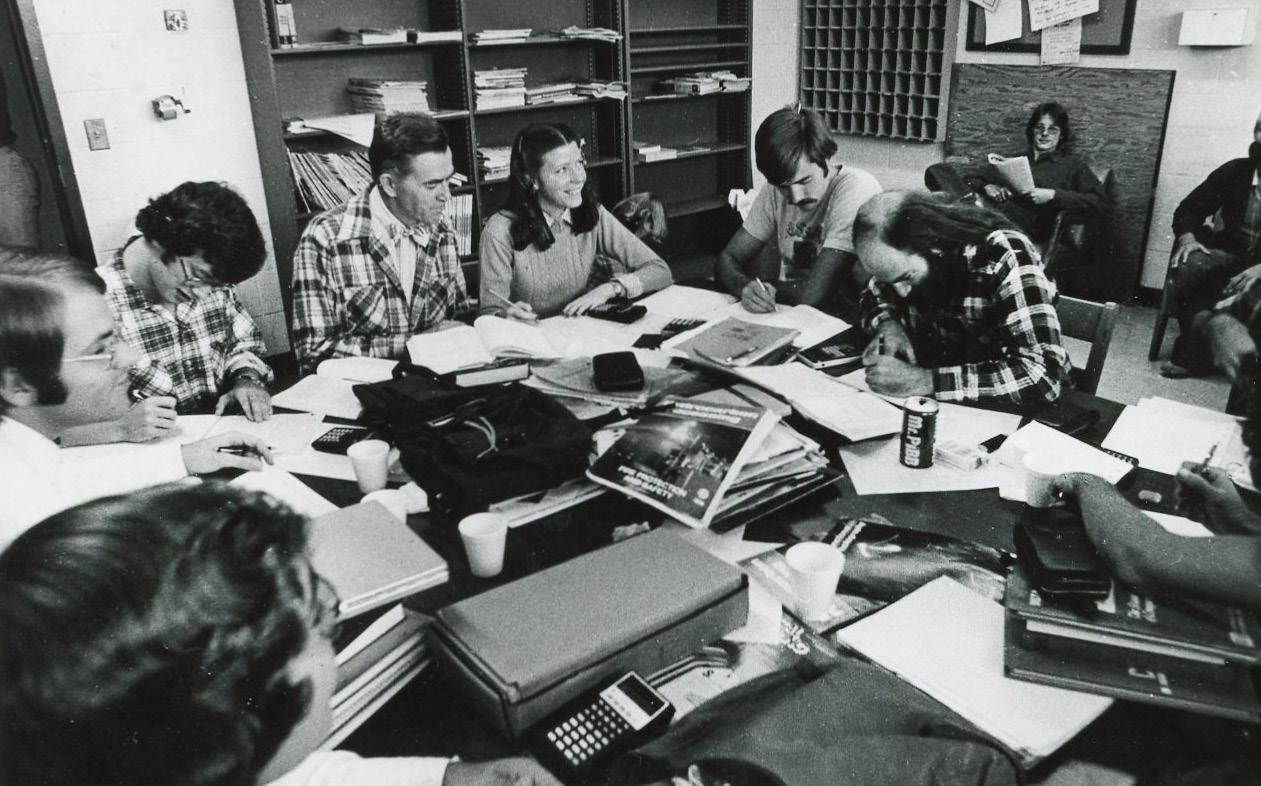
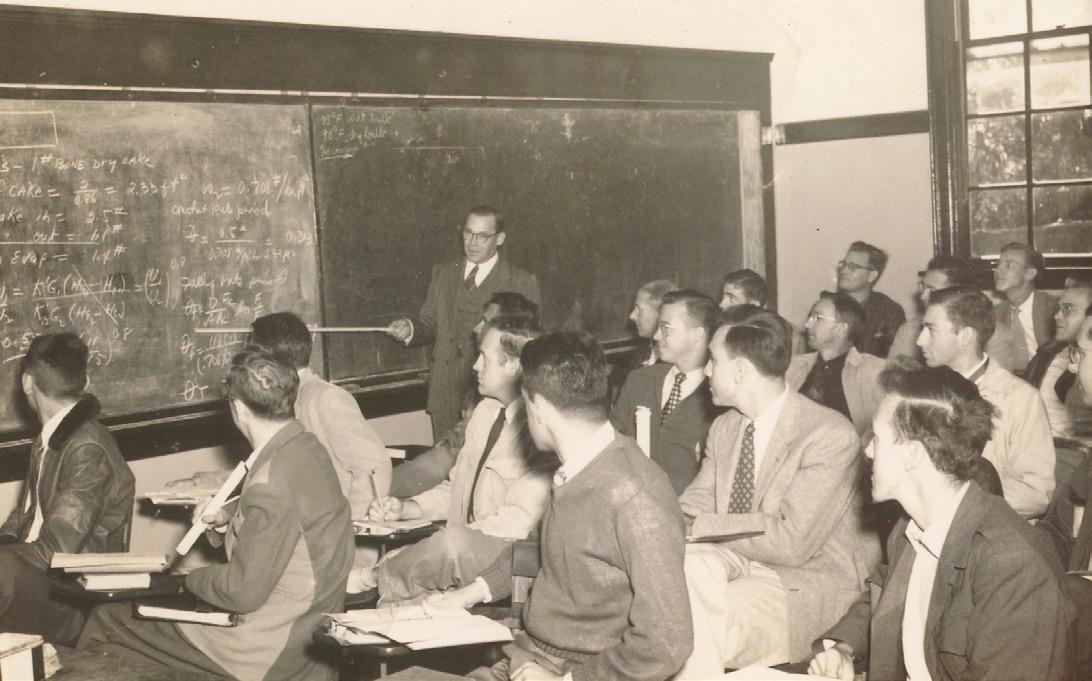
Professor Mark Orazem started with the University of Florida in 1988, nearly 20 years after the current chemical engineering building was constructed. What does he remember most? His office door.
“Because of the building’s shifting, unstable foundation, I would be unable to open the door to my office,” said Orazem, now a distinguished professor and associate chair for Graduate Studies. The building was eventually stabilized, allowing Orazem’s door to function properly.
As renovations to the building ramp up, let’s take a look at where it all started.
Chemical Engineering became its own department in 1916. Courses in chemical engineering began in 1905 as part of the Department of Chemistry and were taught by chemistry professors in Leigh Hall until 1939, when they moved to the now-demolished Benton Hall until 1950. During World War II, the ROTC erected a Quonset hut airplane hangar for military training, near the current Stephen C. O’Connell Center. But when a new building was built for their operations in 1950, the hangar was acquired to expand engineering operations.
Shirley Kelly, the graduate academic advisor who has been with the department for 58 years, experienced working in the hangar firsthand. She remembered the metal building was either “too hot or too cold or too leaky or too stinky.”
But it was home for over 20 years and was fertile ground for groundbreaking research.
In 1969, the current facility was built; a brick and concrete department hub for 56 years.
Discover more history and reflections.


FACULTY & STAFF UPDATES
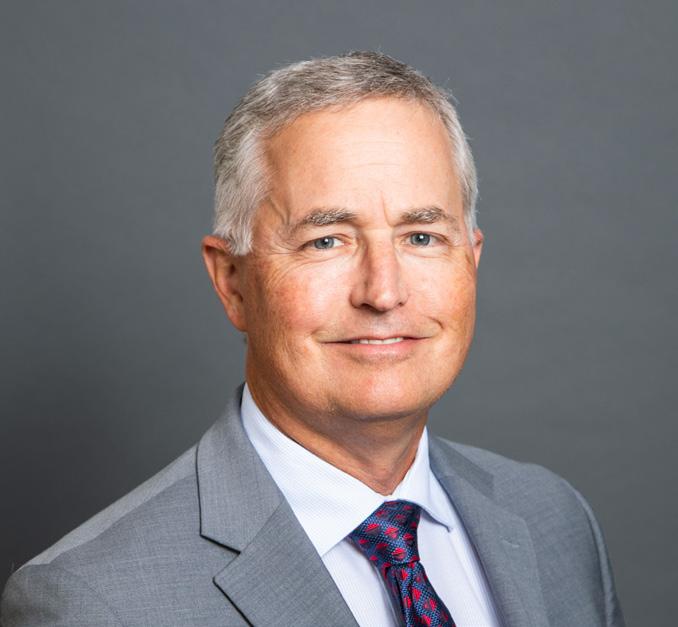
Dickinson, a professor, will serve as interim department chair, effective August 16. Dickinson has been a faculty member since 1994 and served as department chair from 2009 to 2017. Under his leadership, philanthropic contributions to the department grew dramatically, enabling the construction of the Chemical Engineering Student Center and a fourfold increase in endowed faculty positions.

Kelly, graduate student adviser, celebrated 58 years at the department in May. In 1967, Kelly was the first Black person hired by the University of Florida. She worked in the department when it was located in a small Quonset hut where the Stephen C. O’Connell Center is now. She still has students from decades ago who visit her when they are in town. And we hope she will stay until at least her 60th year.

Bolcar began her time in the department in 2019 as a fiscal assistant, later becoming a research assistant. In 2024, she transferred to UF’s Health Outcomes and Biomedical Informatics as an accounting specialist.
“After only a few months, however, I missed everyone and the warm and welcoming environment at ChE more than I expected,” she said. She has returned to her old position as a research assistant.
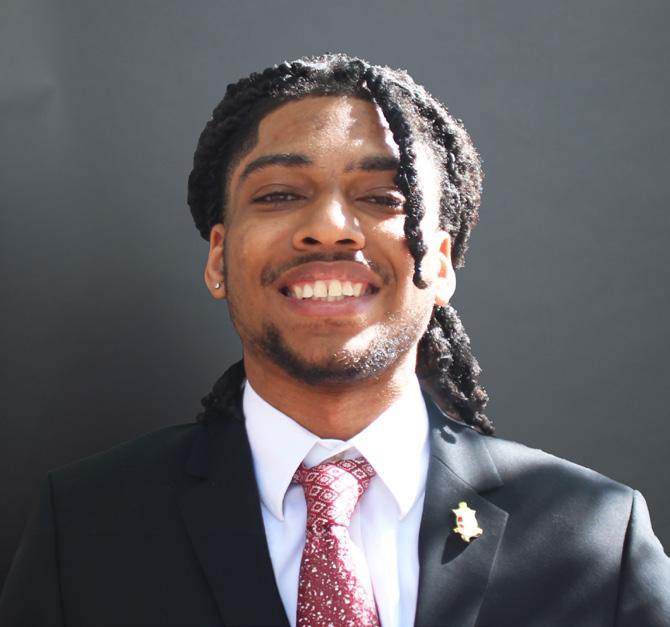
Khaalil Williams-Frierson
Williams-Frierson joined the department, as well as the Department of Biomedical Engineering, in late February, as a research administration assistant. Previously, he worked at the UF Bookstore while pursuing his master’s in Sustainable Development Practice and served as president of the Gator Chapter of the National Society of Black Engineers.
Richard Dickinson, Ph.D.
Shirley Kelly
Amanda Bolcar
THE MULTIFACETED JOURNEY OF A PH.D. STUDENT FROM BIOSENSORS TO BADMINTON
By Ada Lang and Dave Schlenker

Hsiao-Hsuan (Renee) Wan, a third-year Ph.D. student, is advancing semiconductor and biosensor research. With her foundation from National Taiwan University, Wan’s work spans ultrawide bandgap semiconductors and biosensors for cancer detection.
Wan came to her academic choice organically because her Taiwanese family has a strong background in chemical engineering. Her mother holds a Ph.D. in chemical engineering and her father has an M.S. in chemical engineering. Growing up in this environment naturally sparked her interest in the field.
Wan’s parents had successful career paths and seeing the impact of their work inspired Wan to follow a similar path. She was drawn to how chemical engineering principles can be applied to rapidly advancing and cutting-edge technologies such as semiconductors and biosensors, and her research focuses on those two areas.
Wan’s research takes place in the lab of Fan Ren, Ph.D., a distinguished professor in the Department of Chemical Engineering. Her work is helping her reach her goal of contributing to “developments that improve people’s lives, whether by enhancing medical diagnostics or advancing electronic devices. The idea of creating something impactful motivates me every day,” she explains.
When not focusing on her schoolwork, Wan is passionate about badminton and has been playing for over 15 years. She is in UF’s badminton club and represents the Herbert Wertheim College of Engineering in tournaments. She is particularly proud of her team’s first place win in a 2022 regional competition. Once she graduates and has more free time, her bucket list includes traveling to Iceland to witness the aurora borealis.
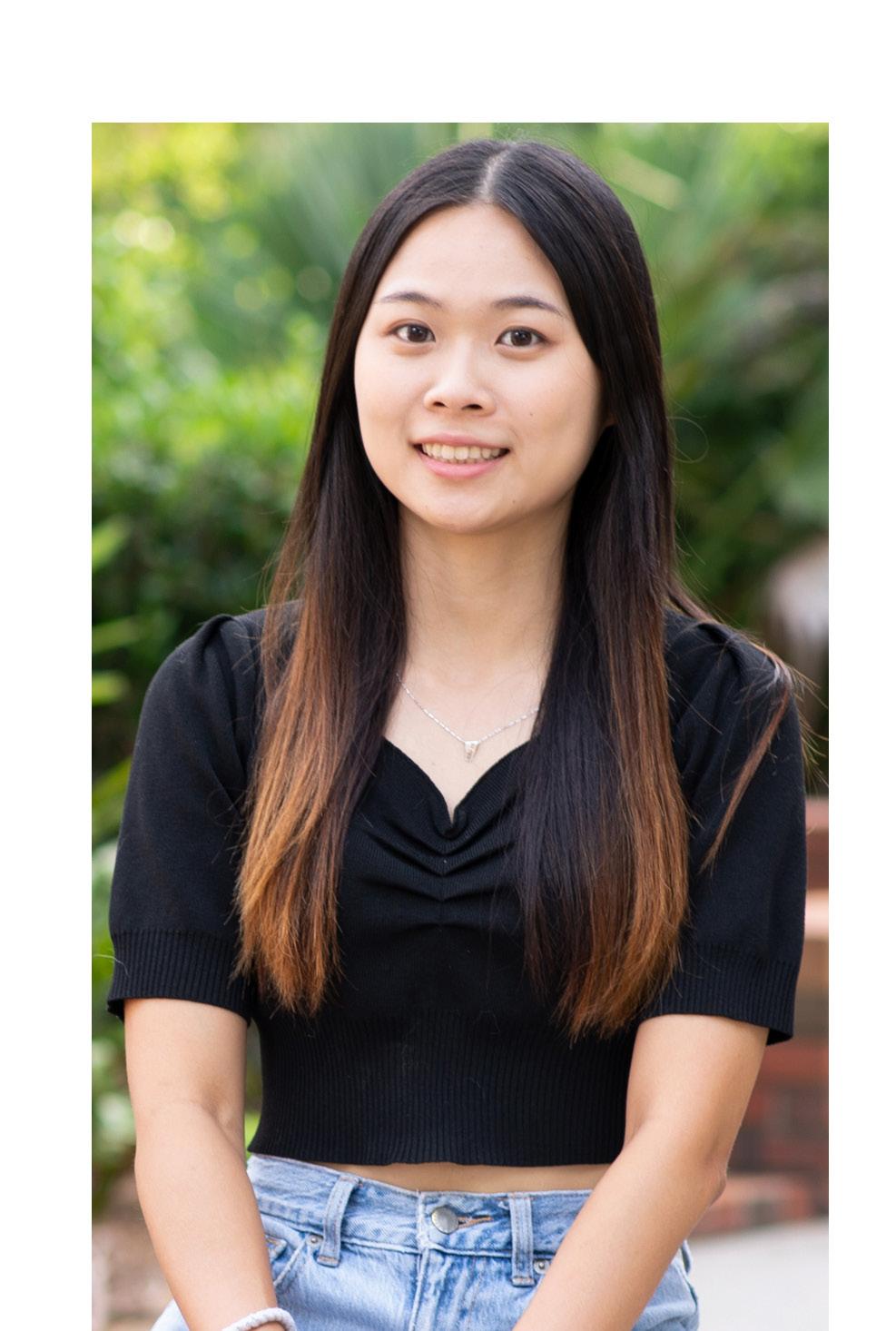
> WHAT DID YOU WANT TO BE GROWING UP?
An R&D scientist. I enjoy tackling different challenges, which brings me a great sense of accomplishment. In Dr. Ren’s group, I work on semiconductor and biosensor projects, which are vastly different areas.
> WHAT IS THE MOST INTERESTING PROJECT YOU HAVE WORKED ON AT UF?
Recently, I worked on an intriguing semiconductor project where we used liquid nitrogen to simulate the environment of space and test our device. This experience was incredibly exciting because, instead of testing at room temperature, we evaluated our device under harsh conditions, potentially making it suitable for use in vehicles traveling to different planets. It felt like I was getting closer to something that once seemed very distant.
Even more fascinating was that some of our designs worked, and we observed some interesting phenomena. Based on these findings, we can design even better devices, bringing us closer to real-world applications.
> WHAT ARE YOUR BIGGEST ACCOMPLISHMENTS?
In the semiconductor project, I broke the world record for breakdown voltage in lateral AlGO and lateral AlN devices. In the biosensor project, I successfully developed a functional biosensor that gained significant attention.
I received interview requests from many news outlets. I recently earned the Ministry of Education of Taiwan’s Government Scholarship to study abroad and further my studies and research at UF. The $32,000 fellowship will provide two years of support for my thesis. The scholarship is very competitive in Taiwan and very difficult to obtain.
TWO PH.D. CANDIDATES RECEIVE PRESTIGIOUS NSF FELLOWSHIPS
By Sindia Rivera-Jimenez and Ada Lang
Caroline Lubbe and Aniela Nozka, both Ph.D. candidates in chemical engineering, were selected to receive the National Science Foundation’s Graduate Research Fellowship Program (NSF GFRP).
“This highly competitive fellowship aims to ensure the quality, vitality, and strength of the scientific and engineering workforce of the United States,” said Carlos Rinaldi-Ramos, Ph.D., chair of
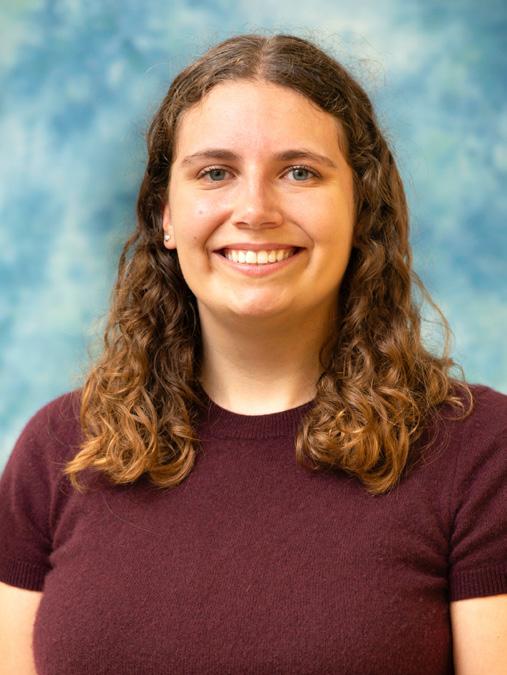
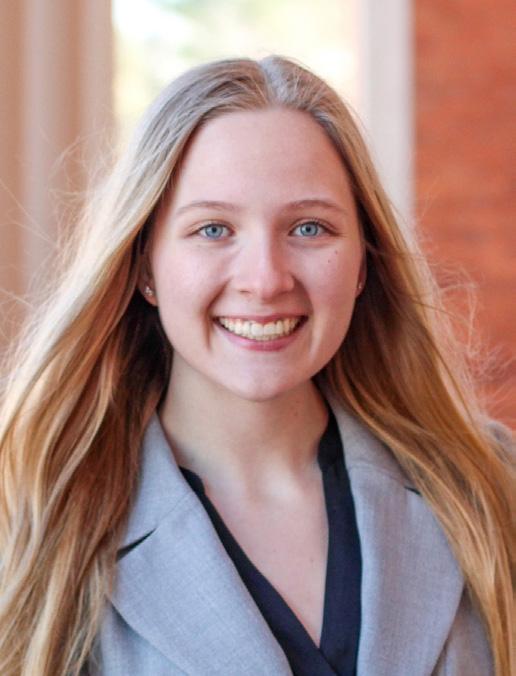
the Department of Chemical Engineering.
Lubbe and Nozka benefited from the efforts of Whitney Stoppel, Ph.D., assistant professor, and V.J. Tocco, Ph.D., instructional assistant professor, in preparing many of the department’s undergraduate and graduate students to compete for this prestigious award. The five-year fellowship provides three years of financial support, including an annual stipend of $37,000.
Caroline Lubbe
Lubbe was named an NSF GRFP awardee in STEM Education and Learning Research for her proposal that will be conducted in the UF Department of Engineering Education (EEd). This fellowship recognizes her academic excellence and potential to make a meaningful impact on research and society.
Under the guidance of Sindia M. RiveraJiménez, Ph.D., an assistant professor in EEd, Lubbe will lead a longitudinal mixedmethods study using an intersectionality lens to explore the post-transfer experiences
Aniela Nozka
Nozka was named an NSF GFRP awardee in chemical engineering. Her research is focused on nanomaterials for biomedical applications under the advisement of Rinaldi-Ramos.
“I work on formulating nanocarriers for magnetic particle imaging-guided cancer hyperthermia treatment,” Nozka explained. “In this study, I hope to improve magnetic fluid hyperthermia treatment as a cancer therapy by developing thermal dosimetry methods and quantifying relationships between nanoparticle distribution within the tumor and treatment efficacy.”
While pursuing her undergraduate degree at Clemson University, Nozka’s research focused on synthesizing magnetic nanoparticles that would also be used for magnetic hyperthermia applications.
“This propelled me into the field, so I
of transfer students. As the first UF chemical engineering Ph.D. student focused on engineering education research, she applies policy-driven research methodologies to support transfer students in researchintensive institutions.
Lubbe discovered her passion for engineering education through the Research Experience for Undergraduates program. Since then, she has mentored four undergraduates, published and presented two conference papers, won a best poster award, completed an NSF policy internship, and is working on two peer-reviewed publications for this summer.
joined the Rinaldi-Ramos lab to continue working on these nanomaterials,” she said. “I decided I wanted to focus more on the biological applications of these materials for my Ph.D., so now my work is on that.”
“My goal for this fellowship is to, in my research, gain skills in nanomaterial formulation and characterization as while as techniques in cell culture and in vivo experiments. I also want to network with people not only in the field of magnetic nanoparticles, but also in nanomedicine,” Nozka added.
In 2022, Nozka participated in the REU program, doing research in Rinaldi-Ramos’ lab under the guidance of Ph.D. candidate Ambar Coral Velázquez-Albino. She and Velázquez-Albino co-authored and published a manuscript about their research. In 2024, she presented her research at three conferences: NanoFlorida, in Tallahassee, Florida; NanoDDS in Orlando, Florida; and Frontiers in Magnetic Carriers, in Barcelona.
HOW MENTORSHIP AND COMMUNITY SHAPED ONE PH.D. CANDIDATE’S FUTURE
By Ada Lang
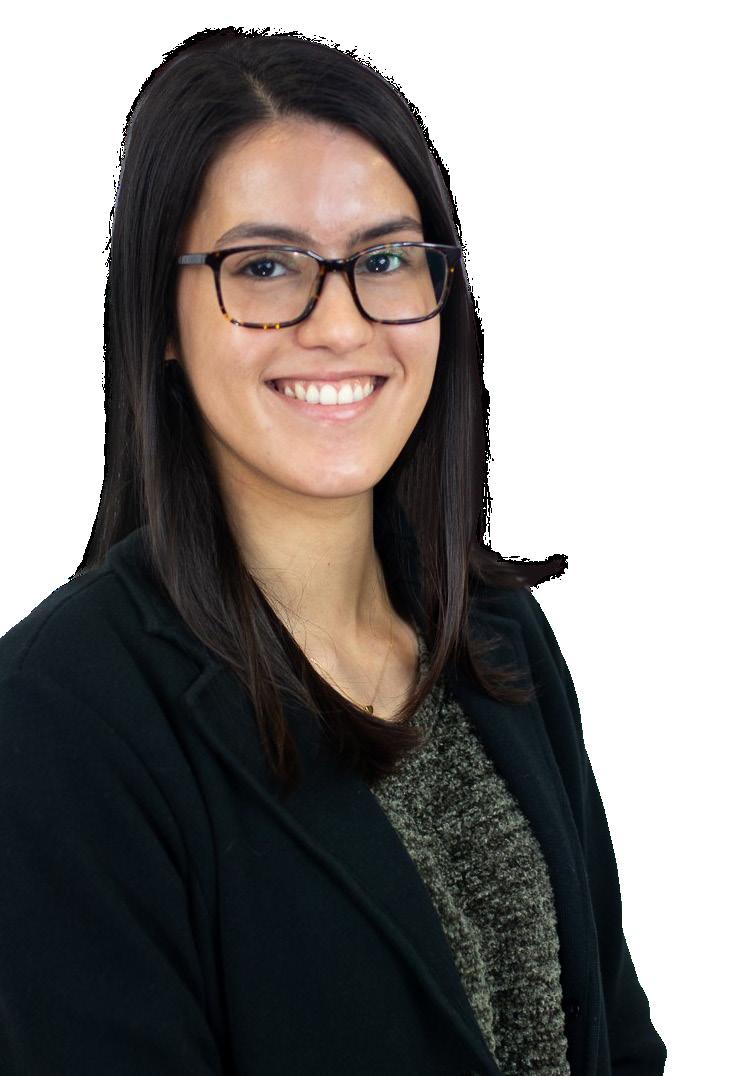
Ambar Coral Velázquez-Albino, a Ph.D. candidate defending her dissertation this summer, attended the NextProf Nexus program this past summer after meeting a professor from the University of Michigan at AIChE 2023 in Orlando. Sasha Cai Lesher-Pérez, Ph.D., encouraged her to apply during a poster presentation, where they met and had an opportunity to speak.
Velázquez-Albino, who is from Mayagüez, Puerto Rico, plans to graduate in December 2025 and has been interested in pursuing an academic career. But she said she wanted to find out more about the field before making a decision.
The NextProf Nexus program
“is a sneak peek into the real experiences of many professors, which can be rare and eye-opening,” she said.
“It was very inspiring to hear raw and vulnerable stories from so many professors. It showcased the struggles that are often faced behind the curtain, while also highlighting what a fulfilling job the professoriate can be,”
said Velázquez-Albino, who is being advised by Carlos Rinaldi-Ramos, Ph.D., the department chair.
The common theme of impostor syndrome came up that weekend and Velázquez-Albino said speaking with professors at the program who also experienced it was a highlight. She said she realized that it is human to doubt yourself as you learn new things and push your boundaries as you grow.
“The vulnerability of so many has made me a more confident scientist, making me realize that my impostor syndrome does not erase how much I enjoy doing research and want to continue doing so,” she said.
Additionally, Velázquez-Albino received the McKnight Dissertation Fellowship and had the opportunity to attend the 2024 McKnight Annual Fellows’ Meeting and Research & Writing Conference. She said the opportunity to connect with other academics from underrepresented backgrounds strengthened her passion to be in academia and have a positive impact on other’s lives.
After graduating, she said she plans to continue her learning by taking a post-doc position, preparing for a faculty position and “entertaining entrepreneurial ideas” that can expand upon her dissertation. Her research focuses on exploring methods to synthesize superparamagnetic metal oxide nanoparticles to enhance Magnetic Particle Imaging (MPI) performance.
UNDERGRADUATE STUDENT AWARDS
Addison Pound Scholarship: Alexander Saperstein • Biery Scholarship: Jasmeet Bhatt, Flynn Balton • Fahien Teaching Award: Justin Atlas, Samaa Lehri • Fernandez Family Scholars: Pedro Cintron Baerga, Lewis Jordan • Gerald & Elaine L. Gibson Scholarship: Pedro Cintron Baerga, Sean Clark, Abbas Kothawala • Horatio Algers Scholars: Michael Parker Baugh, Seaira Mckenzie Torrens-Baker, Ryan M. Dauphinee, Maria McDonald • Inez Culp Goodrum Scholarship: Isabel Lucia Matias Cruz • John & Mittie Collins Engineering Scholarship: Maganda Holmes • LAC Scholarship Spring 2025: Carlos Samuel Olmedo Iniguez, Isabel Lucia Matias Cruz , Conan Hooker Humphries, Santiago Guanipa • Leadership & Service to the Profession (Senior): Sarah Flannery • Professional Achievement (Senior): Brooke Erickson • Research Achievement (Senior): Marian Pulgar • Service to the Community (Senior): Ian Lange • Wayne H. Chen Scholarship: Abigail Andal, Zella Tavai
GRADUATE STUDENT AWARDS
Fahien Teaching Award: Shreyanshu Agrawal, Connor Pope • MS Research, Leadership, and Service Excellence Award: Seyednima Ajayebi, Shivani Biskunda, Henry Lutz, Nanqi Lin • Peer Mentoring Award: Yinhao Jia, Ryan Johnson, Sree Laxmi, Nicole Kragt, Marisa Pacheco • Ph.D. Leadership and Service Excellence Award: Elizabeth Aikman, Nikki Kragt • Ph.D. Research Excellence Award: Hayden Good, Jooyong Shin, Mohammed Al Otmi, Chao-Ching (Chester) Chiang • GRACE Symposium Oral Presentation Winner: Cynthia Eluagu, Victor Rivera-Llabres, Yunhan Chuai, Caroline Lubbe, Raymond Pho
AICHE ANNUAL CONVENTION, 2024
SAN DIEGO, CALIFORNIA
2023-2024 Outstanding Student AIChE Chapter: UF AIChE chapter
ChemE Cube: (Justin Atlas (captain), Sanaa Lehri, Milana Ivanenko, Abigail Andal and Rebecca Vosilla)
Ad Competition, first place
Cheapest Cube Competition, second place
Undergraduate Recognitions:
Poster Competition:
Food, Pharmaceuticals and Biotechnology, second place
Cecilia Rodriguez
Computing and Process Control III, third place
Dominick Szabo
2023-2024 First Year Student Recognition Award: Isabella Baccari
2023-2024 Donald F. Othmer Second Year Student Academic Excellence Award:
Camille Grimald
Sarah Flannery and Flynn Baliton presented a workshop “Building a 3-Pillar Outreach Program for Your Student Chapter.”
Graduate Recognitions:
Mohammed Al Otmi presented a talk at the graduate student excellence awards session for the Materials Engineering and Sciences Division.

CHEME CUBE TEAM QUALIFIES FOR 2025 NATIONAL FINALS
CHEM-E-CAR TEAM WINS FIRST PLACE
An elite team of engineering students and their “cube” qualified for the AIChE ChemE Cube national finals recently through a virtual presentation. The presenting team consisted of Abigail Andal, Alexandrya Aven, Camille Grimaldi, Joel Gritmon and Kage Jones. The team will be traveling to the 2025 National AIChE Conference, which will be held in Boston this November. Their task will be to create a modular, directair capture mini-plant with both adsorption and regeneration that can fit within one cubic foot and should be marketable as a modular CO2 capture device. It should create an impact by demonstrating technological breakthroughs, be able to address a market and benefit humanity.
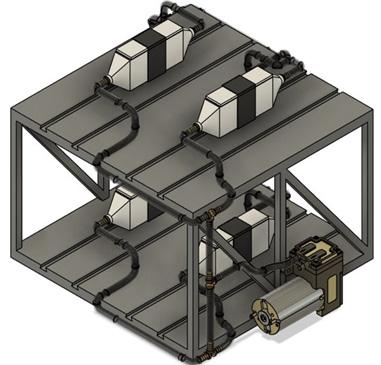
Cu Later Gator — the studentbuilt, chemically powered car — took first place at the 2025 AIChE Southern Regional Student Conference Chem-E-Car competition and third in the poster competition. The UF team, advised by Dmitry Kopelevich, Ph.D., traveled to Tampa to present their design. The Chem-E-Car competition challenges students to build a car powered and stopped entirely by chemical reactions. Teams are divided into Power, Stopping, and Electromechanical subgroups to create a fully functioning vehicle. UF’s team of 16 students — four of whom compete — has a history of success, including a 2022 win. They’ll compete at nationals this fall, showcasing UF excellence beyond the classroom.


Sunil Roy’s journey started in India, wound through Gainesville and, for now, landed him in Silicon Valley. He came back to UF earlier this year to speak to students about those years, and more specifically, his experiences at the University of Florida.
He began his college education studying at the Indian Institute of Technology, also known as IIT Kharagpur, a research university in Kharagpur, West Bengal, India. He then applied to UF’s Department of Chemical Engineering and completed his master’s and doctoral degrees within four years.
Under the guidance of Mark Orazem, Ph.D., a distinguished professor, he focused on electrochemical engineering and conducted research on fuel cells and batteries — technologies at the forefront of clean energy.
“Completing my Ph.D. and M.S. within four years not only accelerated my technical growth but also fostered a growth mindset — one that continues to drive me in pursuing new ventures with confidence and resilience. It was also an immensely fulfilling experience,” Roy explained.
After graduating 17 years ago, Roy began his career at Intel, which gave him a solid foundation in semiconductor technology across five cutting-edge technology nodes.
“This experience built my foundation in process technology development, equipment design and zero-defect manufacturing,” he said.
Over the years, he held key roles at Intel, Philips Lumileds and Applied Materials. In 2023, he transitioned into a leadership role at QuantumScape, allowing him to translate his research on hydrogen fuel cells and lithium batteries into commercial innovation.
Passionate about team development, Roy was elected chair of the American Society for Quality (ASQ) Silicon Valley section and has mentored more than 50 engineers toward ASQ certifications
SUNIL ROY REFLECTS ON HIS YEARS AT THE UNIVERSITY TIME AT UF Profound
By Ada Lang
and increased engagement among 2,000+ professional members.
Roy shared some additional thoughts about his time at UF.
> WHAT PROFESSORS, COURSES OR PROGRAMS HAD A SIGNIFICANT IMPACT ON YOUR EDUCATION?
My journey at UF was profoundly shaped by the mentorship of my advisor, Mark Orazem. His guidance, combined with the rigorous coursework in Electrochemical Systems and Impedance Spectroscopy, equipped me to address industrial challenges effectively. My co-advisors, Eric Wachsman, Ph.D., and Helena Hagelin-Weaver, Ph.D., helped me expand my learning in Material Characterization and Catalysis, providing a comprehensive technical foundation.
> HOW DID YOUR UF EXPERIENCE INFLUENCE YOUR APPROACH TO PROBLEM-SOLVING AND INNOVATION?
My research approach was deep and linear, providing a strong foundation for my professional career. However, industry challenges require rapid problem-solving to address immediate customer needs and multiple stakeholder interests. Incremental progress is valued, and swift iteration is critical.
> HOW DID YOUR EXPERIENCE HELP YOU DEVELOP VALUABLE SKILLS?
I was privileged to have Professor Orazem as my advisor, whose mentorship and international affiliations provided invaluable exposure to the Electrochemical Society (ECS). Attending multiple ECS conferences deepened my understanding of cutting-edge electrochemical advancements and facilitated networking with industry and academic leaders. As the first president of the UF ECS chapter, I had the opportunity to develop leadership skills, organize events and build meaningful connections, which were pivotal in shaping my academic and career trajectory.
Sunil Roy
> WHAT ARE SOME OF THE MOST VALUABLE TAKEAWAYS YOU’VE LEARNED SINCE GRADUATING?
One key insight stands out: The complexity of challenges and the number of people involved grow exponentially over time. Success lies in rapidly iterating toward optimal solutions while aligning teams toward a shared vision.
My experience at UF’s Chemical Engineering department instilled the confidence to navigate uncertainty, develop expertise in new fields and cultivate a growth mindset. Passion — excelling in the present while staying connected to a larger purpose — drives progress, and conviction sustains it. With discipline and adaptability, we propel ourselves toward excellence.
> WHAT ADVICE WOULD YOU GIVE STUDENTS PURSUING A CAREER IN CHEMICAL ENGINEERING?
Chemical engineering provides a strong foundation in core competencies that are highly sought after across industries, particularly in process development and technology innovation.
A degree from UF is a powerful credential that will open doors throughout your career.
> WHAT ARE THE MOST IMPORTANT LESSONS YOU LEARNED WHILE AT UF?
The rigorous research environment at UF honed my ability to navigate complexity, think critically and push beyond conventional boundaries — skills that remain integral to my professional journey. Most importantly, my experience reinforced a key lesson: Success in unfamiliar domains is driven by discipline, perseverance and a strong work ethic.
> HOW DID YOUR EXPERIENCE INFLUENCE YOUR PERSONAL AND PROFESSIONAL LIFE?
The curriculum and research fostered a deep sense of confidence. It also broadened my perspective on global diversity, reinforced a lifelong pursuit of knowledge and deepened my appreciation for clean technology. This journey not only shaped my expertise but also instilled a commitment to advancing sustainable solutions on a global scale.
FROM GRADUATE STUDENT TO FACULTY
HOW NETWORKING HELPED HANSEL MONTALVO FIND HIS PATH TO ACADEMIA
By Ada Lang
Until recently, Hansel Montalvo was a fourth-year Ph.D. student exploring reaction mechanisms and material catalysts to produce alkenes and aromatics. However, it’s networking that helped him get selected into two prestigious programs this summer and helped him determine his next career step.
Montalvo met Beata Kilos, Ph.D., a Dow Fellow, when she delivered a graduate seminar at the University of Florida. Her encouragement prompted him to apply to the Building Engineering and Science Talent (BEST) Symposium, which is intended to introduce underrepresented doctoral and postdoctoral scientists to the wide range of careers in industrial research. Montalvo was accepted, and he attended last summer. He was also selected to attend the NextProf Nexus Program after encouragement from colleagues and faculty who participated in the program while pursuing their Ph.D.s. Hosted by University of Michigan, University of California Berkeley and Georgia Tech, this program is for individuals who show potential to become faculty.
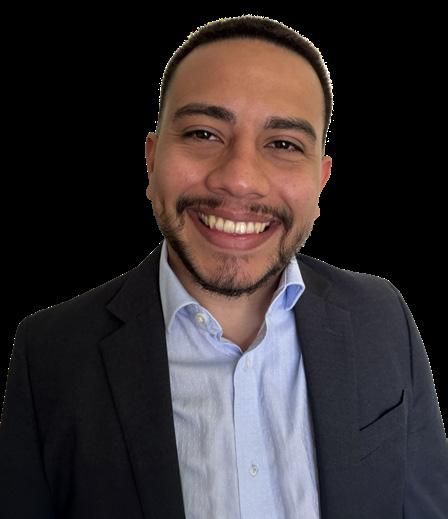
Montalvo said he applied so he could explore careers in both academia and the private sector.
“Pursuing a Ph.D. is challenging and comes with sacrifices, so I owed it to myself to look at all the opportunities out there,” he said. “I strongly encourage my peers to do
the same, so that they can find the best place and environment for them to thrive.”
Both programs were immersive experiences, complete with seminars and panels that help attendees learn how to be competitive faculty candidates or in the case of Dow, to learn about their research and business sectors. While they learned about the plastics economy, circularity and sustainability, participants also presented a potential design responding to those metrics. Additionally, Montalvo delivered a two-minute elevator pitch to Dow members about his research.
Montalvo said that he learned a lot, but more importantly, he “developed long-lasting connections with brilliant people, at different levels and stages in their careers, both in academia and private sector.” He said these experiences gave him insight into academia and the private sector, and led him to decide that an academic career is the path he will take.
Since completing his Ph.D. in August 2024 under the advisement of David Hibbitts, Ph.D., Montalvo has secured a tenure-track faculty position in the Department of Chemical Engineering at the University of Puerto Rico — Mayagüez. He plans to develop a research program on theoretical and fundamental catalysis, in addition to teaching kinetics and reactor design.
“Puerto Rico and its relevancy in the world are at stake, and there are areas of opportunity for the island to grow both,” he said. “Thus, my mission is to contribute to the development of future generations of chemical engineers, who I strongly believe will play a key role in our relevance and existence.”
HANSEL MONTALVO
BUILT ON Family Values, DRIVEN BY Innovation
RYAN MONTES’ JOURNEY TO CEO
By Ada Lang
Ryan Montes’ upbringing in a “humble Latin family” in Florida may seem so different from his experiences at the University of Florida and his career path. But, in reality, their tightly held family values, such as hard work, resilience, and focus on pursuing a better life, are why he has thrived in his field.
These core principles instilled during his formative years would prove invaluable as Montes navigated the rigors of his academic and professional journey.
Montes played college baseball at the Florida Institute of Technology while studying chemical engineering. Balancing his studies with the demands of varsity team travel, serving in student government leadership, and courting his future wife (and UF alumna), Carolyn Montes, M.D., taught him the importance of discipline and focus.
Montes came to UF and earned his master’s degree and then his Ph.D. under the guidance of his mentor, Jason Butler, Ph.D., a professor in the Department of Chemical Engineering, whom he credits for reshaping his thinking and influencing Montes to “push the boundaries in science and tech.” He credits Butler for playing a huge role in teaching him this skill by dedicating his time and effort to helping all his students.
“His willingness to mentor and guide us made a lasting impact,” Montes added. The program also helped him learn to solve problems faster and accelerate innovation.
After graduation, Montes relocated to San Francisco and joined a small startup. He then moved to a slightly larger one, where he expanded his knowledge of inventing instruments for biology

and focused on the intersection of genomics and microfluidics.
This gave him the impetus to leave his stable job and, along with Butler, start MicroPure Genomics, with a vision to “improve lives by making genomic analysis accessible anytime, anywhere, and for anyone.” While at UF, Monte’s helped invent MicroPure’s core technology, Electro-Hydrodynamic (EH) Purification, which selectively purifies and concentrates genomic material within a simple microfluid channel that is within a larger but still compact, integrated device.
“It is the only comprehensive end-to-end solution that dramatically reduces preparation time, complexity (in both labor and steps) and costs, revolutionizing the future of genomic sequencing,” Montes said. “This transformative innovation represents the first major breakthrough in the field in over 30 years, positioning MicroPure at the forefront of genomic technology.”
Running his own company has taught him new skills, including fundraising, and he is very proud of securing over $1.5 million in funding for MicroPure Genomics.
“As a scientist, I was never formally trained in fundraising, so this achievement means a great deal to me,” he said. “It reinforces my ability to lead MicroPure to success by ensuring we have the resources to advance our science.”
With backing from the National Science Foundation, Montes continues to pioneer in the field of genomic healthcare.
“I have always had a strong sense of purpose and direction, mainly to help people and rise to a position where I can drive
Ryan Montes
meaningful change for the middle and lower classes,” Montes said. “Growing up in a humble Latin family instilled strong values in me, and it became clear that real change requires people willing to step up. I believe that one day, I will be a successful entrepreneur leading a revolution in healthcare, and beyond that, I aspire to continue making a lasting impact on society.”
Montes shared a few more thoughts about his time at UF.
> CAN YOU SHARE ANY FAVORITE UF PROFESSORS, COURSES, OR PROGRAMS THAT HAD A SIGNIFICANT IMPACT ON YOUR EDUCATION?
Jason E. Butler, Ph.D., Fan Ren, Ph.D., and the Engineering Leadership Certificate Program.
> WHAT WAS YOUR FAVORITE PART ABOUT YOUR TIME AT UF OR AT THE CHE DEPARTMENT?
The friendships, mentorship, and knowledge I gained have profoundly shaped my life for the better and were my favorite parts of the program. At UF, I made lifelong friends whom I still talk to daily. Their impact on my life has been profound. My time at UF was incredibly meaningful, especially from the perspectives of friendship, family and mentorship.
> HOW DID YOUR EXPERIENCE HERE INFLUENCE YOUR PROFESSIONAL LIFE?
With my newly honed skills and thought process, I secured highprofile R&D positions straight out of graduate school and was able to contribute to new scientific advancements and patents within my first two years in the field. UF provided me with a strong fundamental background while teaching me how to think through situations more quickly and clearly.
> WHAT ADVICE WOULD YOU GIVE TO CURRENT STUDENTS OR THOSE CONSIDERING ATTENDANCE AT UF CHE?
Go for it! UF has an outstanding program with top-notch professors who genuinely care and invest in their students. The ChE department at UF will help you unlock the best version of yourself.
> HOW DID YOUR TIME HERE HELP YOU DEVELOP A SENSE OF PURPOSE OR DIRECTION?
I have always had a strong sense of purpose and direction, mainly to help people and rise to a position where I can drive meaningful change for the middle and lower classes. Growing up in a humble Latin family instilled strong values in me, and it became clear that real change requires people willing to step up. I believe that one day, I will be a successful entrepreneur leading a revolution in healthcare, and beyond that, I aspire to continue making a lasting impact on society.
> WHAT ARE SOME OF THE MOST VALUABLE TAKEAWAYS OR LESSONS YOU’VE LEARNED SINCE GRADUATING FROM HERE?
Don’t be afraid to be yourself and dream big! As the next generation of scientists, engineers, and entrepreneurs, we have a responsibility to drive the world toward a brighter future for all.
UF-BRED MICROPURE GENOMICS AWARDED COMPETITIVE NSF GRANT
By MicroPure Genomics Inc.
MicroPure Genomics Inc., a revolutionary sample prep technology company with deep University of Florida roots, has been awarded a National Science Foundation (NSF) Small Business Innovation Research (SBIR) grant for nearly $1.3 million to conduct research and development on redefining front-end sample preparation for genomic analysis in research and healthcare.
“This NSF SBIR phase II award is a testament to the groundbreaking work our team is doing to redefine genomic sample preparation,” said Ryan Montes, Ph.D., (MS ‘15, Ph.D. ‘18) CEO of MicroPure Genomics. “We are on a mission to break down the barriers to genomic analysis, to enable genetic testing everywhere, for any purpose, and by anyone.”
With this NSF funding, MicroPure — co-founded with Jason Butler, Ph.D., a professor in the UF Department of Chemical Engineering — will accelerate product engineering and validation, preparing MicroPure’s first system, the µPrep, for pilot deployment with key opinion leaders and leading genomic research organizations.
Sample preparation is increasingly recognized as a critical bottleneck in the genomic testing workflow. While sequencing, genetic testing and the back-end informatics technologies have advanced rapidly, front-end processes remain slow, manual and error-prone. As the number and complexity of genomic assays continues to grow — from single-cell applications to liquid biopsies — the need for scalable, automated prep solutions has never been more urgent. MicroPure is addressing this overlooked gap with the only fully automated, end-to-end platform designed for modern genomics.
In parallel with this funding, MicroPure recently relocated its headquarters to San Diego, one of the nation’s leading biotechnology hubs. The move strategically positions the company in proximity to world-class talent, infrastructure, investors and potential collaborators.
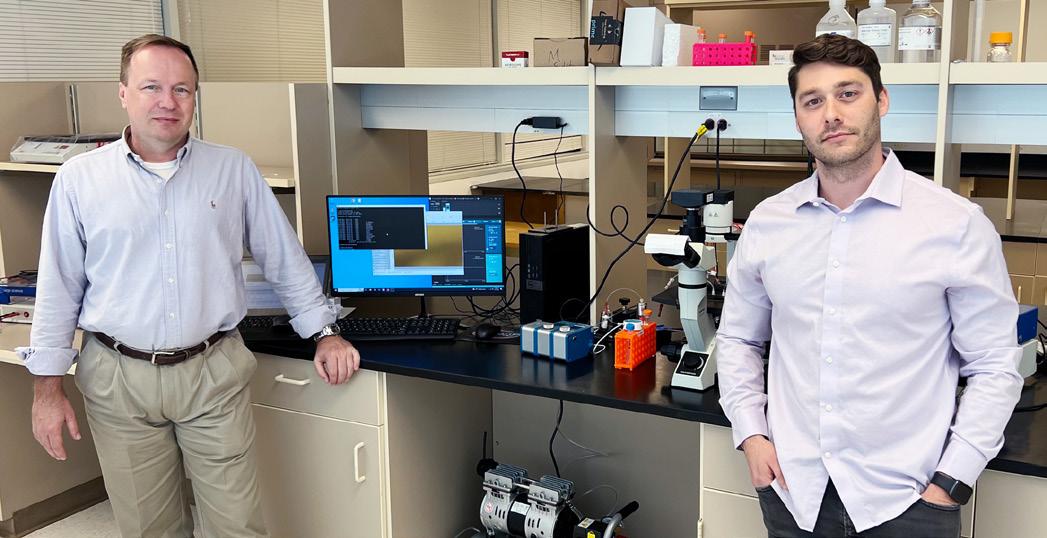
Jason Butler, Ph.D., left, and Ryan Montes, Ph.D., are shown in the MicroPure lab in 2023. (Credit: Ryan Montes)

ENGINEERING ALUMNUS SHARES LESSONS IN GRIT, GROWTH AND GIVING BACK FROM GATOR TO GROUNDBREAKER
By Ada Lang
Albert DaCosta (BS ‘98) returned to his old stomping grounds recently to discuss life after the University of Florida and offer advice for future graduates.
Now on UF’s Chemical Engineering Advisory Board, DaCosta said he held a variety of jobs growing up, including mowing grass, selling encyclopedias, cleaning movie theaters and spinning tunes as a DJ. He approached these jobs with, he said, a “seizethe-opportunity-with any-opportunity” attitude he utilizes to this day.
These early work experiences taught him that many pathways are possible over your career and lifetime, he told the students during his UF talk in March. After graduation, he worked as a medical sales representative before co-founding Paragon 28 in 2010 — a small, family based orthopedic foot and ankle company. The name “Paragon” was chosen because it means excellence, while “28” was chosen because there are 28 bones in a foot.
In his presentation, he described himself as a “balanced student” who studied hard and socialized. He said he had four job offers after graduation, in part because he worked at perfecting his interviewing skills. He attended every career fair and interviewed with every company he could find. Before each
interview, he studied the companies and reviewed potential interview questions to prepare.
“The most important thing you can do is be passionate, whether that is about the job or a personal interest you may be asked about,” he told the students, noting he has interviewed over 5,000 applicants.
He bases many of his decisions — personal and professional — on family values and experiences. He recalled the time he could not obtain a small business loan, so he tapped into his life savings and recruited his mother as his first investor.
As Paragon 28 became a success, his mother remained at his side — particularly at the New York Stock Exchange ringing the bell when the company went public.
“You must challenge yourself to be uncomfortable every day so that you will grow as a person,” he told the students, noting he was comfortable in medical sales but realized he was not growing as an engineer.
Making meaningful solutions is at the heart of everything he does. DaCosta started his career worried about his own success but learned along the way that making others around him successful was just as important.
A Tribute To Our Supporters
Tim Anderson
Agis Kydonieus & Family
Jay and Yogini Shroff & Family
Alex Moreno
Robert Heinle
Chris and Julianne Birdsall
William and Linda McGrane
Varadharajan Basker
Zoe and Juan Barinaga
Chand Deepak
Craig Davis
Elizabeth Whitby
ExxonMobil
We are thankful to all of our donors. Every gift, large or small, makes a difference and helps advance and improve student experiences. Your gifts to the Chemical Engineering Excellence Fund support scholarships, fellowships, faculty and unrestricted support for the department.
We are especially grateful to our major donors — those who contributed $500 or more this year.
James Sandy III
Mike and Tracy Dickinson
Jennifer Schutte
Douglas White
AICHE-Central Florida Section
Daniel O’Neil
Kent Probst
Matt Pytosh
Wayne Johnson
Robert Goodmark
Micron Technology Inc
Daniel O’Neil
Kimberley Patterson
Stantec Consulting Inc.
Joseph Hutter
Robert Brugman
Lynn Houm
Suresh Pahwa
John O’Connell
George McRae
William and Deborah Mounfield
Travis Anderson
Jatinder Jolly
Patrick Murphy
Charles Revette
A MESSAGE FROM OUR DEVELOPMENT DIRECTOR

The 2024-2025 academic year is over, but the momentum of the Department of Chemical Engineering is continuing to grow! Our undergraduate enrollment is increasing, and our students are thriving. The ChemE Cube team qualified for the competition for the first time this year and won first place in the Ad Competition and second place in the Cheapest Cube Competition at the 2024 AIChE Annual Convention. At the AIChE Southern Regional Student Conference, our Chem-E-Car team won first place in the performance competition and third place in the poster competition.
ChE Building renovations are also underway. These facilities are necessary for the growth of our students, faculty and recruitment. There will be opportunities for donors to name spaces within the building or to contribute to the building fund to bridge the gap in funding received from the state for renovations.
None of this would be possible without the generous contributions of our alumni, friends and industry partners. Each year, support of all sizes makes a difference. We’re especially grateful to the major donors listed above and to those who gave throughout the year, including on Gator Nation Giving Day. Reconnecting with UF is the first step toward making an impact. To learn how you can support the department or contribute to the ChE Building renovations, please contact me at ahelgeson@eng.ufl.edu.
Amy C. Helgeson (BSHE ‘06) Director of Development
Herbert Wertheim College of Engineering Department of Chemical Engineering UNIVERSITY of FLORIDA
P.O. BOX 116005
GAINESVILLE, FL 32611
CHE.UFL.EDU
MAKE YOUR
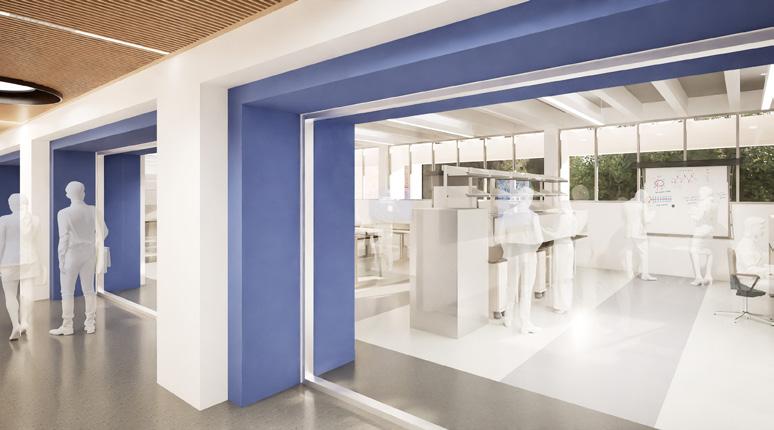
Help Shape the Future of UF Chemical Engineering
In Summer 2025, the chemical engineering building will begin a major transformation — evolving into a cutting-edge facility that reflects our excellence in research, education and student success. State funding has launched this project, but private philanthropy is key to completing it. This is a unique chance for alumni, friends, and industry partners to leave a legacy through naming opportunities and meaningful support.
Your gift will help:
• Expand high-impact research at the frontiers of chemical engineering
• Modernize hands-on teaching labs
• Equip students with real-world tools and experiences
Leave your legacy. Build what’s next.
Contact Amy Helgeson, Director of Development ahelgeson@eng.ufl.edu | 352-294-7953
